| ←(Use Google Translate to see an approximate translation into another relevant language) |
[General index] [Index to chapters] [Index to galleries] [Full family history]
This document contains what I remember about Uncle Pete, i.e. Daniel da Cruz Jr, my father's brother: Son of Daniel da Cruz Sr. (born in Portugal as Manuel da Cruz Narciso in 1880) and Lenore Susan Maria Rager da Cruz. Besides my own memories, I have letters, family albums, documents, and a lot of help from his children: Lina and Danny (Daniel III), my first cousins, and from Rif Haffar, my first cousin-in-law. This is just one part of a larger document addressed to my own children. Key:
Dad = my father, Francis da Cruz Sr., first son of Daniel da Cruz.—Frank da Cruz <fdc@columbia.edu>
Pete or Uncle Pete = Daniel Patee da Cruz, second son of Daniel da Cruz.
Gus = Pete's mother Lenore and my grandmother.
Leila = Leila Shaheen da Cruz, Pete's wife.
Danny and Lina = Pete's and Leila's children.
Mommy = Judy Scott (my ex-wife).
You, you guys, Peter, Amy = my children Peter and Amy da Cruz.
Most recent update: 8 April 2024 13:42:52
Uncle Pete...
[SEE IN FAMILY TREE] [SEE PHOTO GALLERY] [WIKIPEDIA]I deliberately—to the extent I did anything deliberately in my late teens and early twenties—stole from him. I wanted to be like the polymathic, swashbuckling, self-assured, charming, somewhat subversive hard-ass that I saw him to be. And now as I read your story, I am enjoying a morning of self-congratulatory triumph at having, to some extent, been like Dan. And at realizing that my teenage suspicion that this would be an interesting life turns out to be the case. —Rif Haffar (his nephew), January 2018
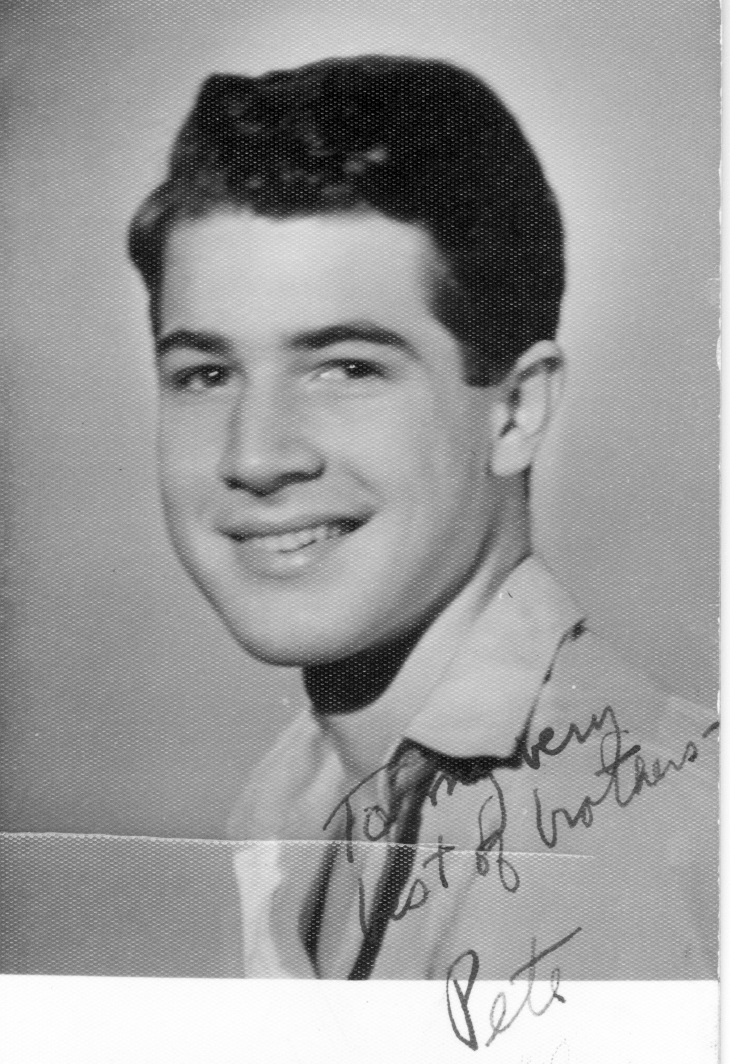
|
| Uncle Pete in 1940 |
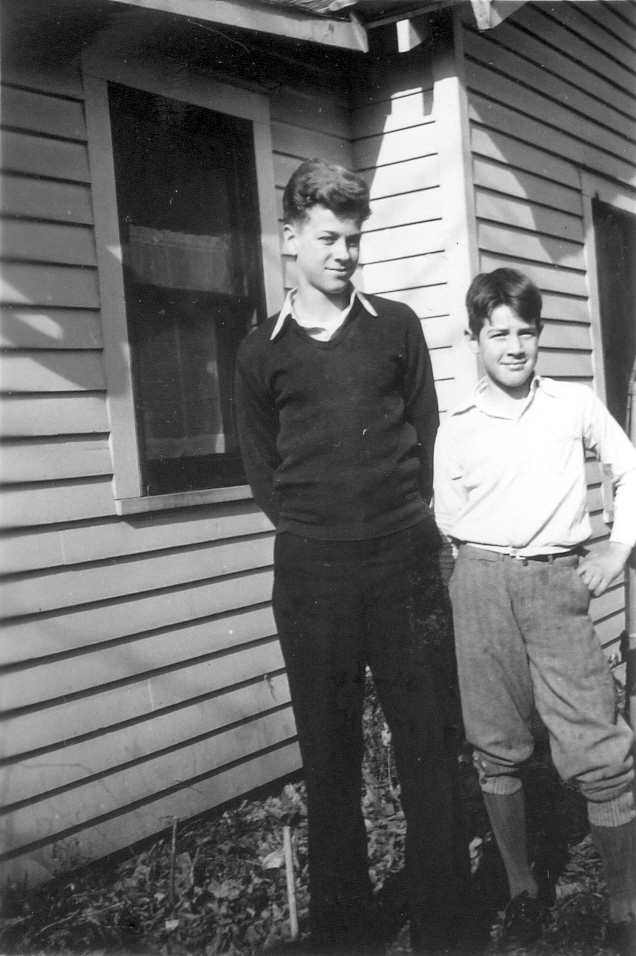
|
| Dad and Pete 1934 |
I recall with utmost clarity an all-night stag party of a bunch of us young-bloods just before we were to enter the university. We were all classmates. The date was September 1, 1939, and toward morning we heard on the radio that the Germans had invaded Poland. By daybreak we had taken a solemn oath, one and all, that war was hell, that we would all refuse to go, and that nothing would change our minds. Within three years everyone of us was in it.
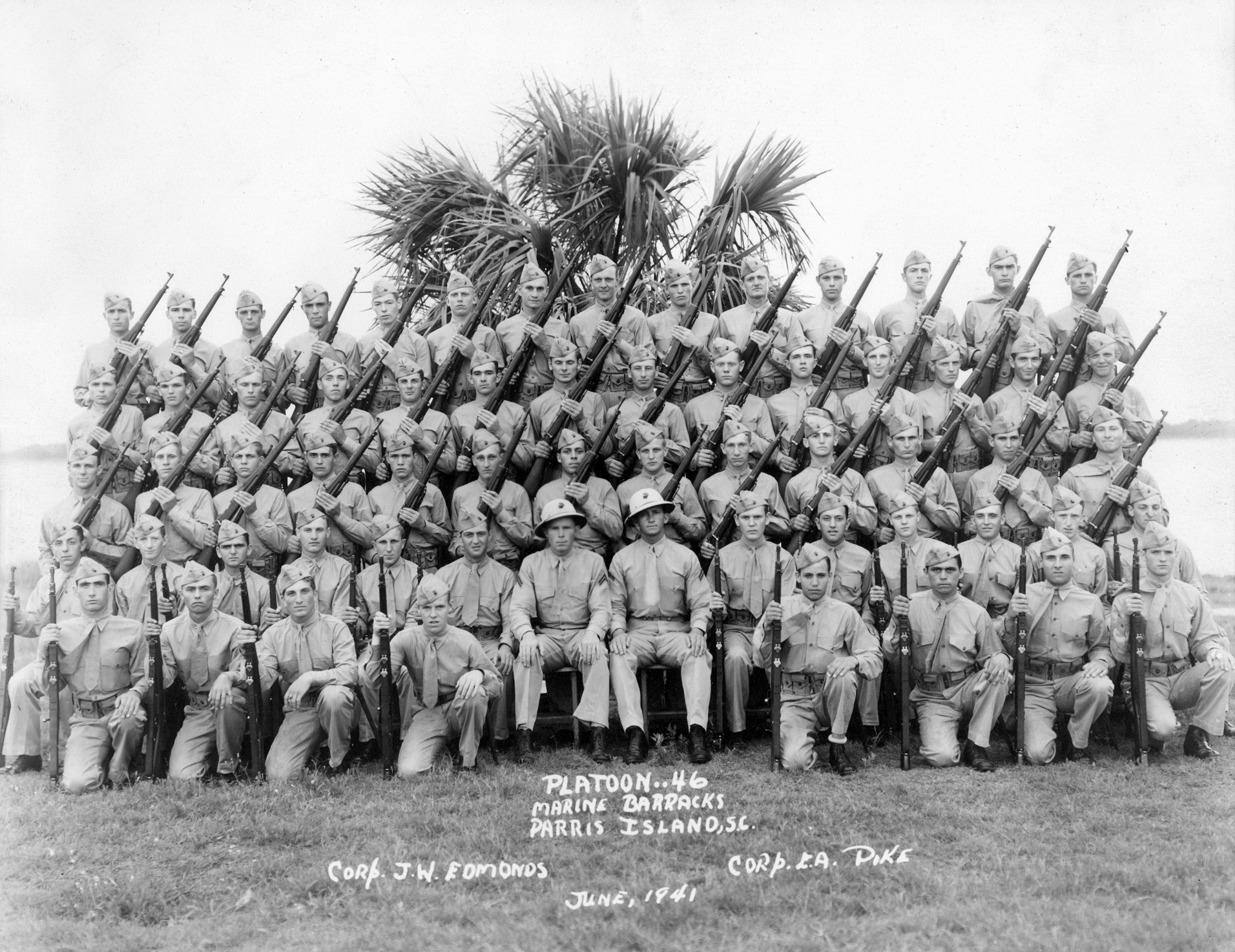
|
| Pete's basic training platoon Parris Island 1941 |
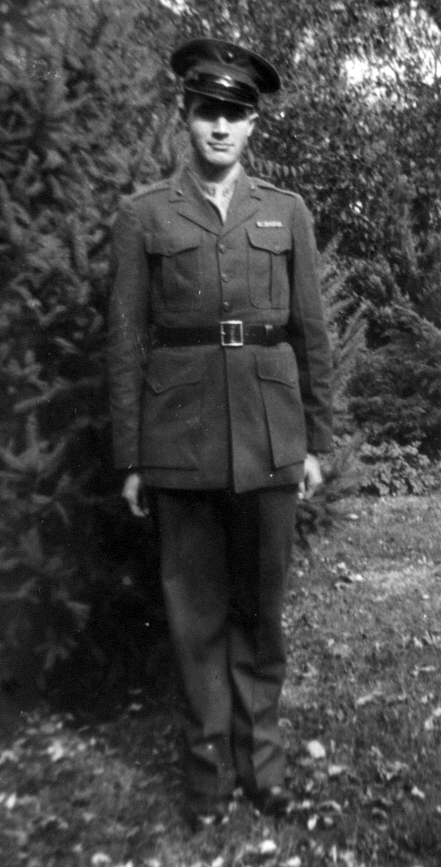
|
| Private 1942 |
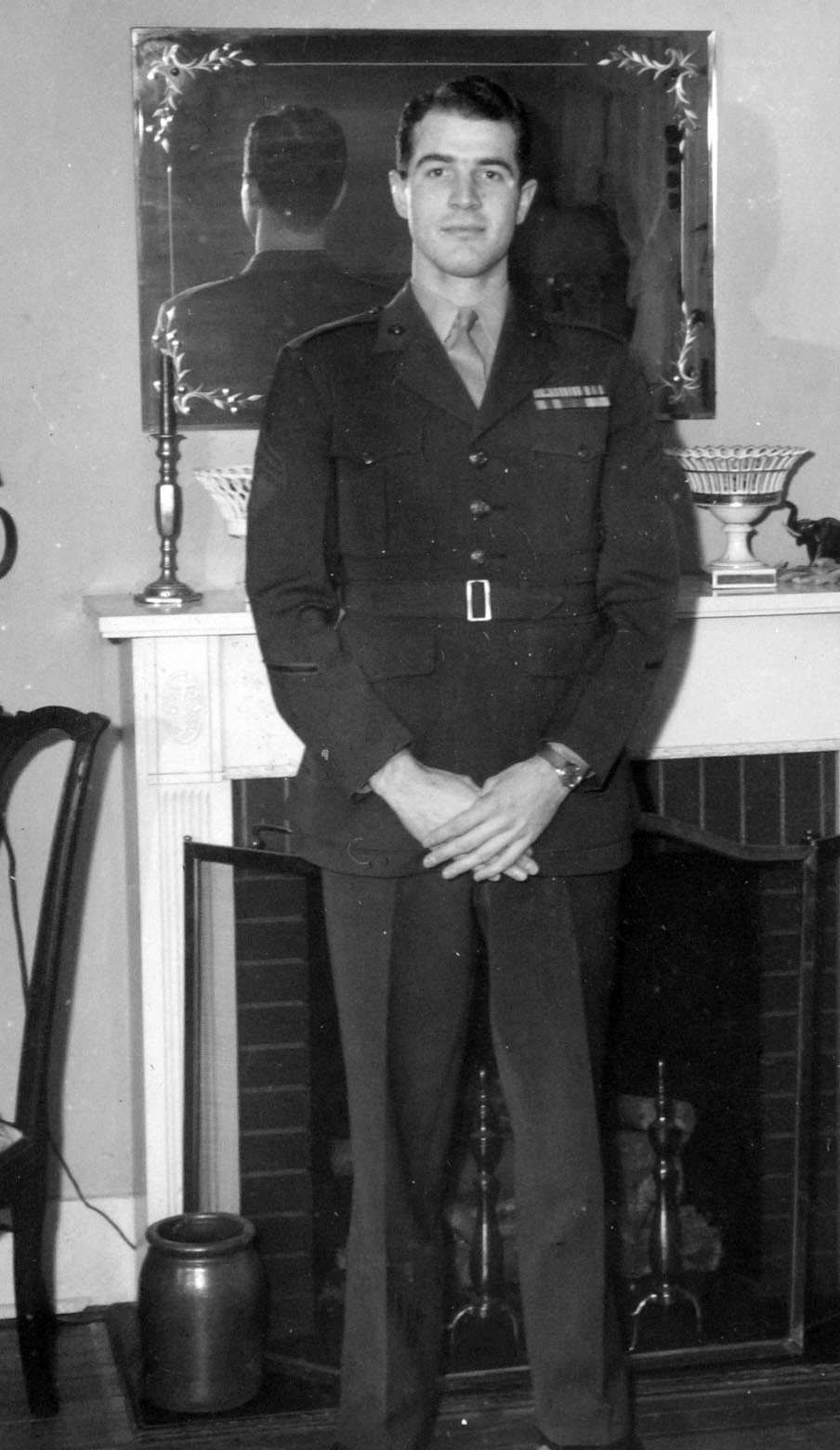
|
| Platoon Sergeant 1947 |
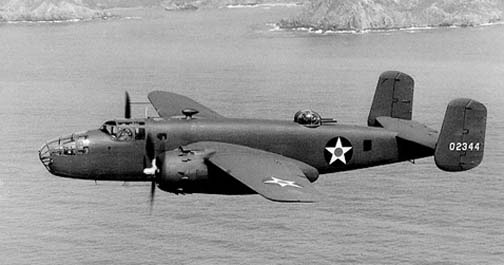
|
| North American B-25 Mitchell medium bomber |
His academic career was put on hold by World War II (inscription found in one of his books by Danny in May 2019, given to him by his mother Gus for Christmas 1941: "Merry Christmas to my darling. Be brave. Ma"), where he saw combat on land, sea, and air in the Atlantic and Pacific as an enlisted man in the Marine Corps. He flew in the front bubble of B-25 bombers as a navigator-bombardier...
Danny says his dad had a story about a training flight where "they got lost above the clouds somewhere over Georgia and they had to bring the plane down below the clouds and close enough to ground to read highway signs, with binoculars I presume, to get their bearings."
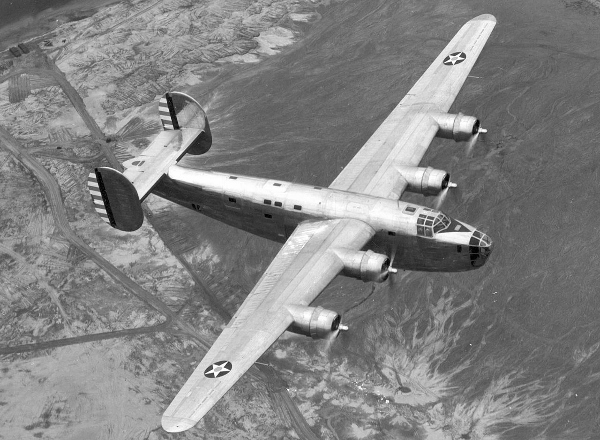
|
| Consolidated B-24 Liberator |
Pete also sailed on the USS Texas and the USS Augusta where he was severely injured in a 5-inch gun explosion, and he fought on Guam where he got "jungle rot", a skin condition that lasted for many years (and eventually had an operation after which his whole head was wrapped in bandages like a mummy, I saw him like that but don't have a picture). He was also on Okinawa and Iwo Jima. I'm sure there's a lot more to his war record but that's all I think I know.
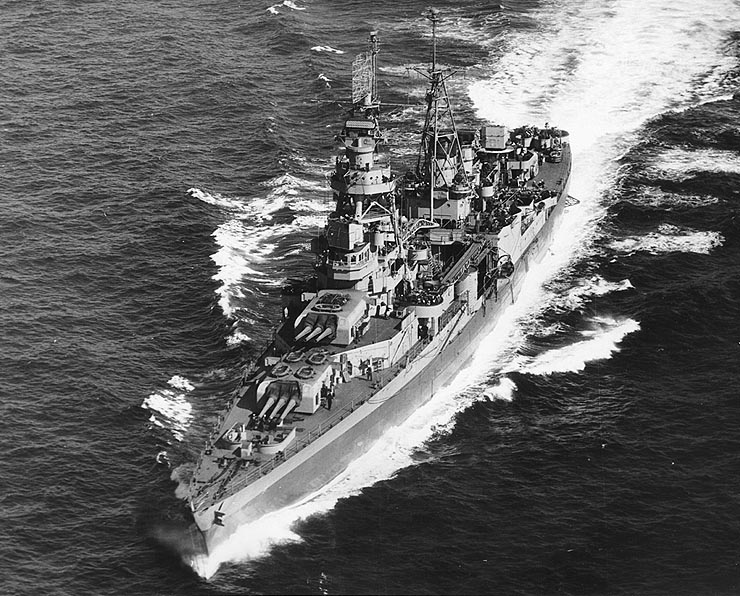
|
| USS Augusta |
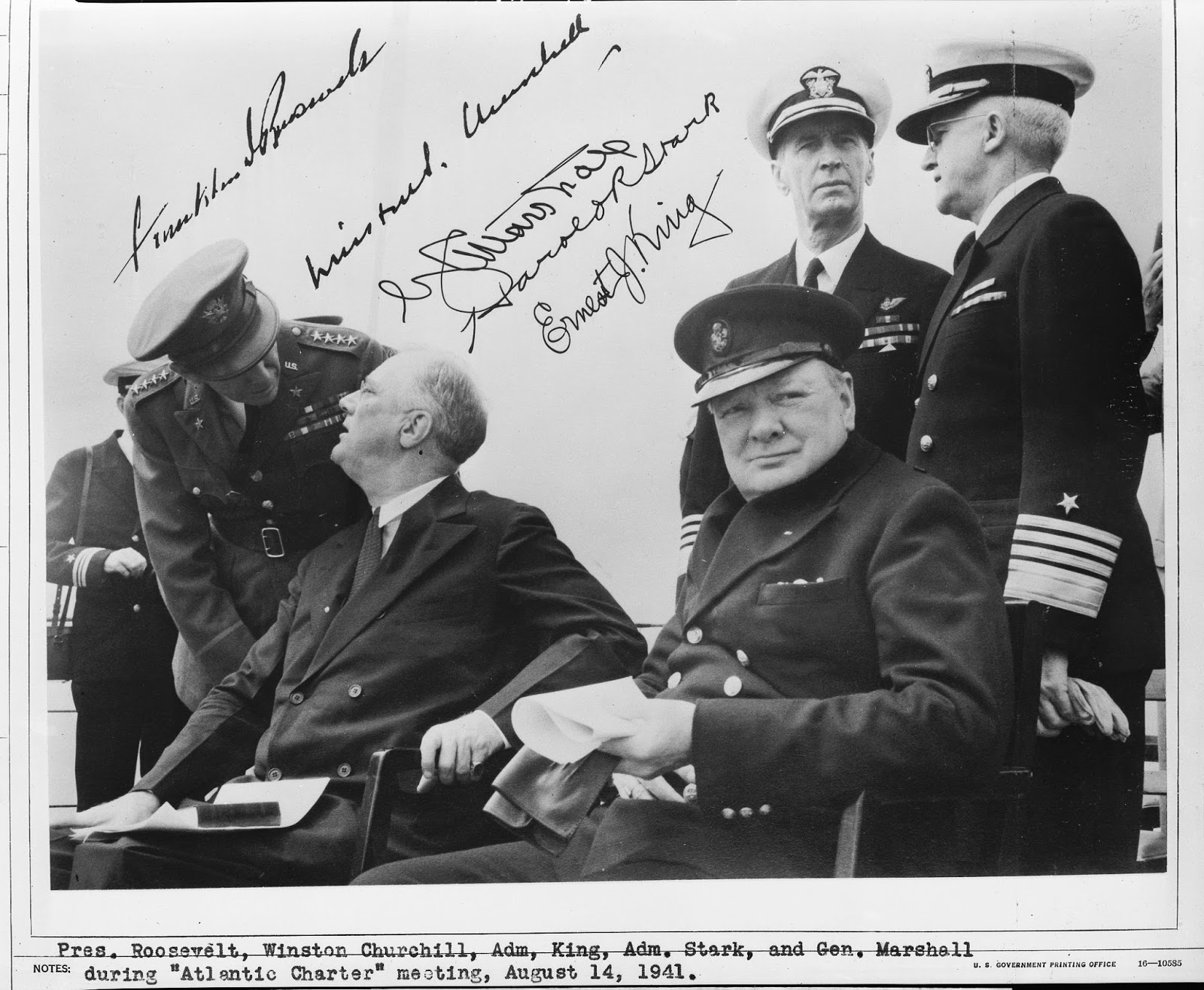
|
| Atlantic Conference |
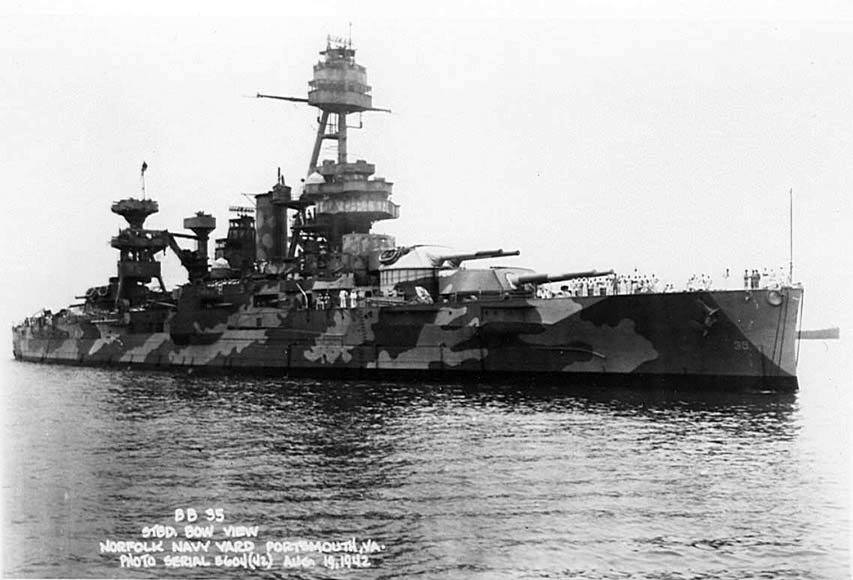
|
| USS Texas |
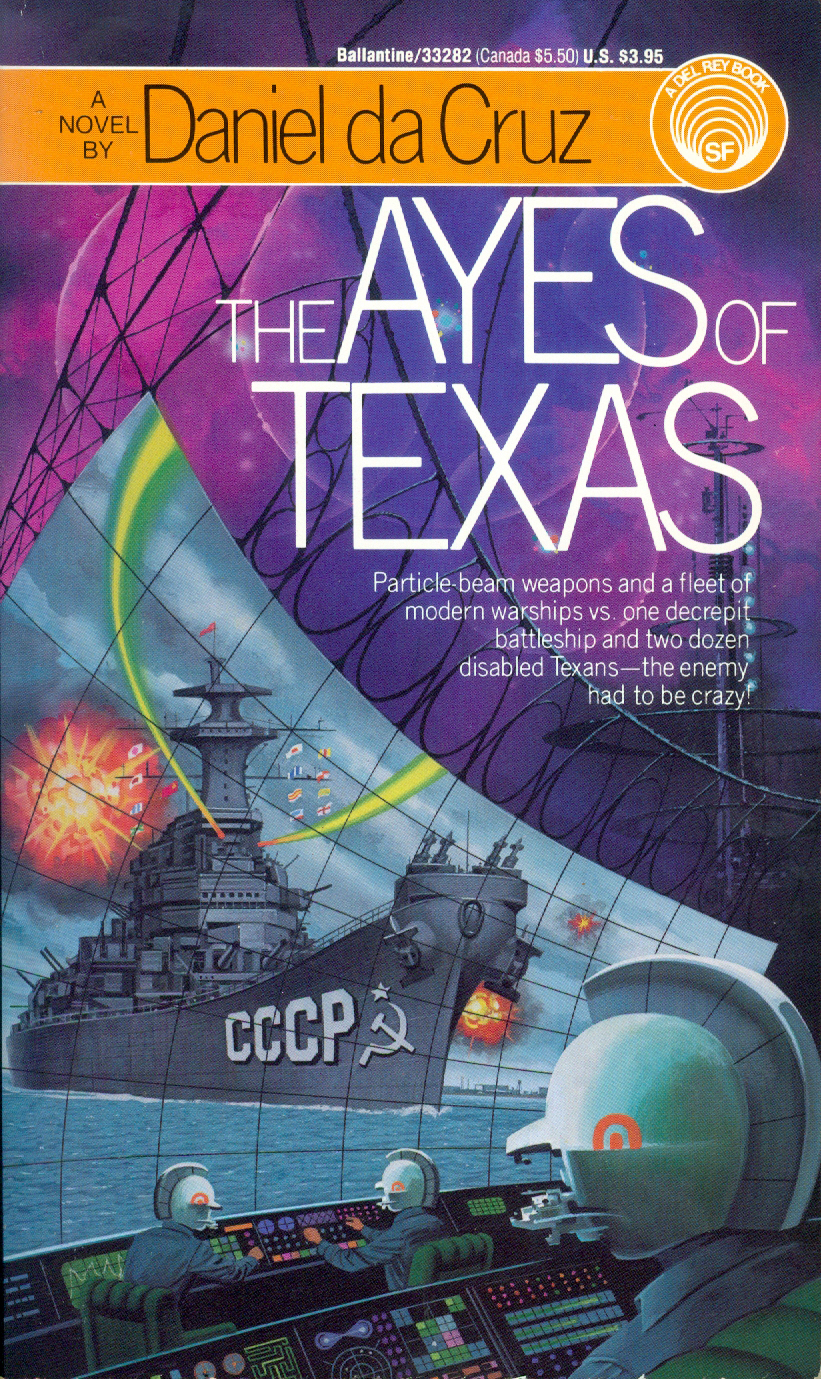
|
| The Ayes of Texas |
It was also the flagship of Admiral Ernest King [standing, second from right, in the second image] at the time, and Dad fondly remembered Admiral King putting his coat on Dad's shoulders one cold night when he was on duty as his orderly. It was later General Patton's flagship during the invasion of North Africa.When he was injured in the explosion my dad found out about it in a comminique that arrived at his code station at the Navy Department. He told Gus and Gus went to meet him when the ship came back, and nursed him until he was ready to live the horrors of Pacific islands; I don't have any stories about this, neither does anybody else — he didn't talk about it much; I vaguely recall some graphic descriptions of the jungles of Guam, but not the details. He was released from service in 1947 as a Platoon Sergeant E6 (three stripes and a rocker). To see what the war in the Pacific islands was like for US Marines, see the HBO "The Pacific" miniseries (2010) produced by Steven Spielberg, Tom Hanks, and Gary Goetzman.
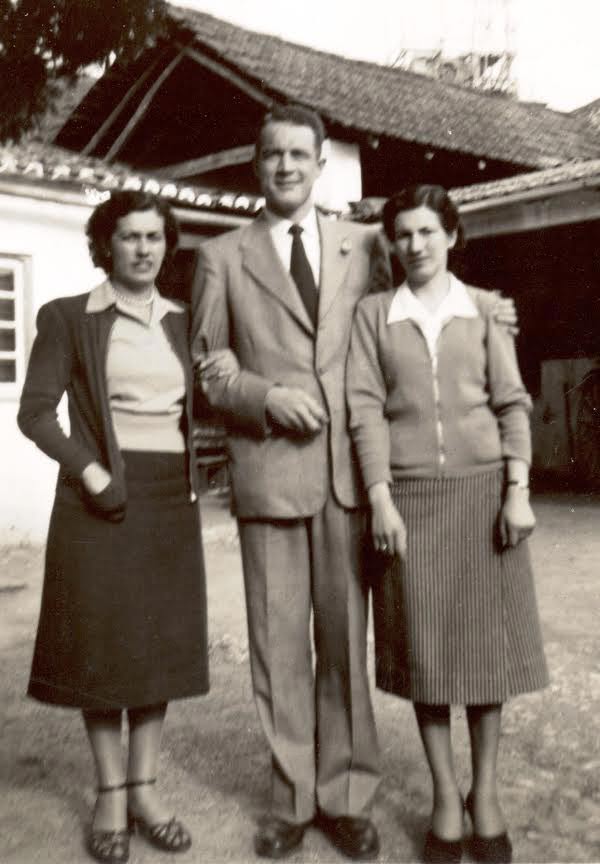
|
| Portugal 1951 |
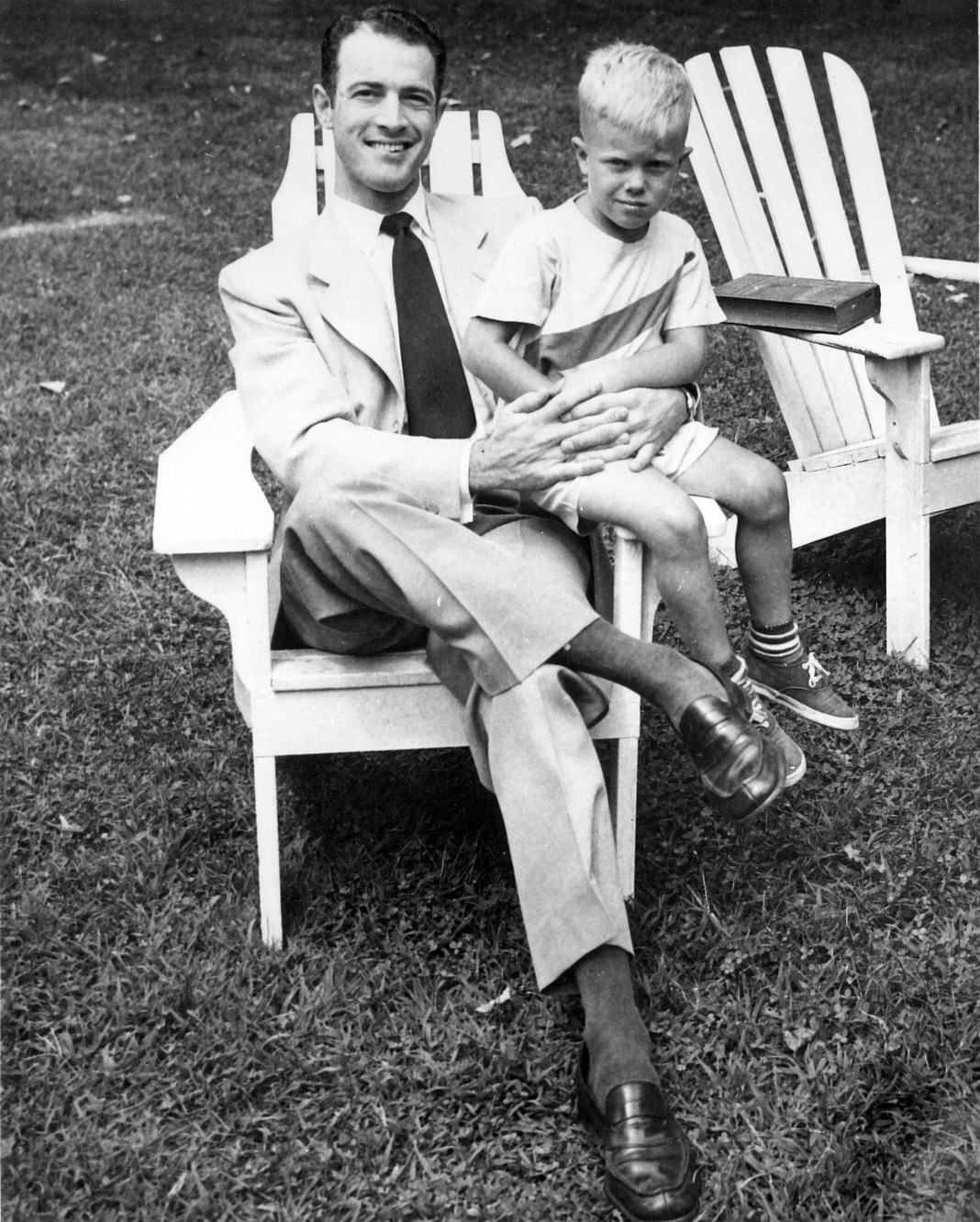
|
| Pete and me in 1948 |
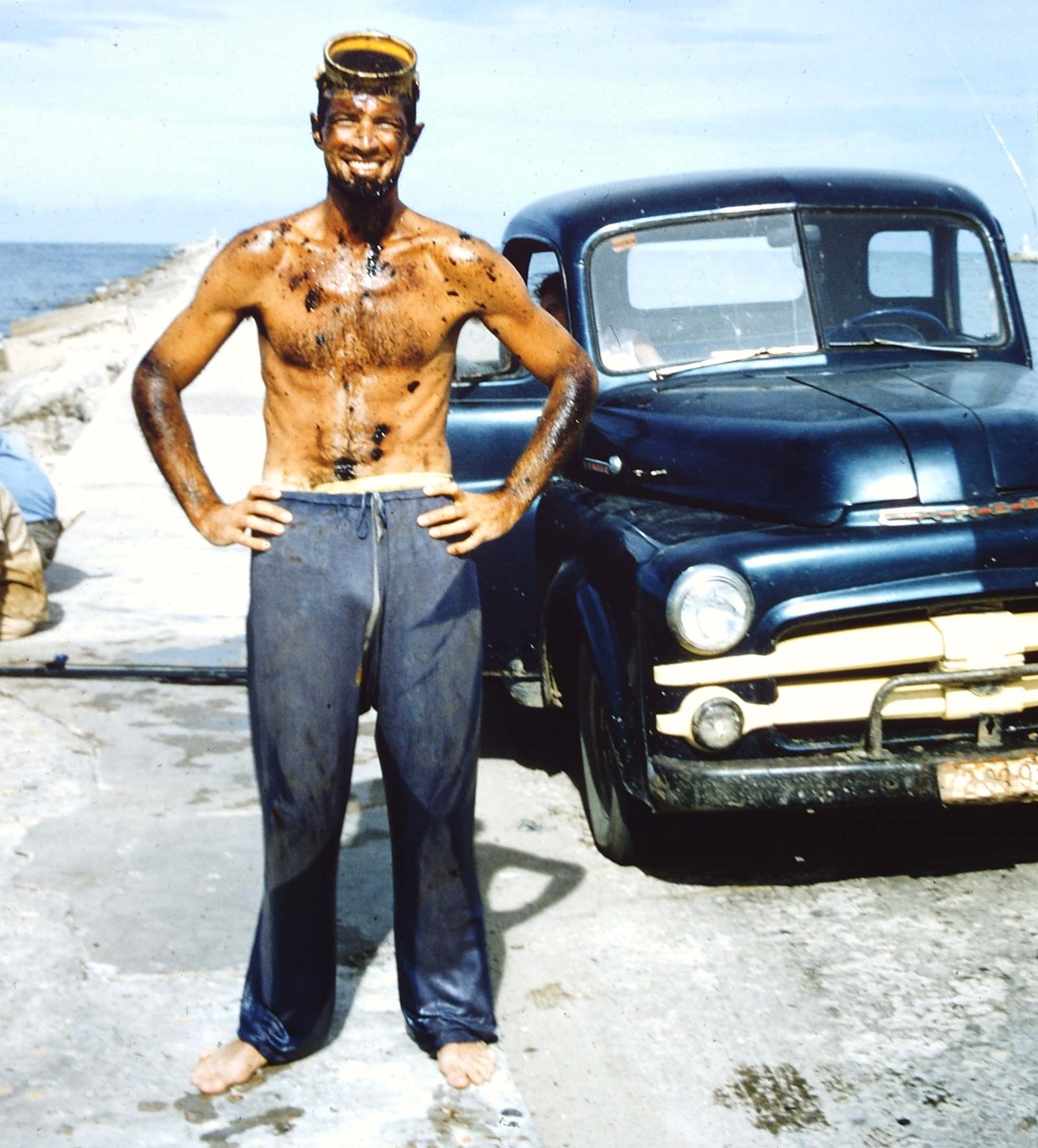
|
| Pete oiled up |
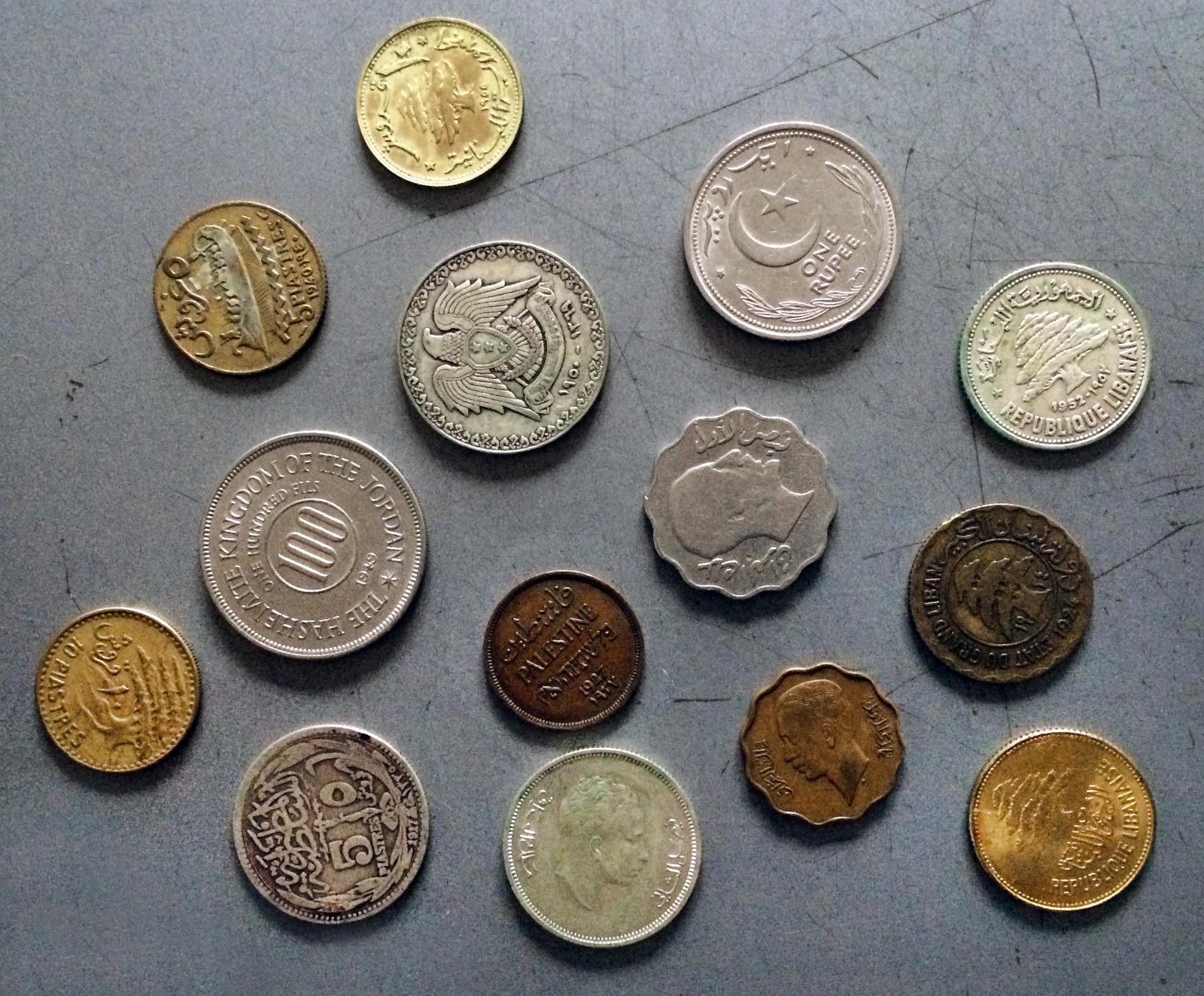
|
| Pete coins (click to see labels) |
Pete and my mom were very fond of each other, sometimes I think they both secretly thought that she married the wrong brother. I remember on one visit he put a lot of time into trying to teach her to drive. Unlike my dad, he was patient, gentle, and encouraging with her, but even so it didn't work out, she was terrified of driving. I don't know why because she tackled all sorts of other challenges with no fuss — Navy Basic Training, riding horses, learning to cook, learning to make our clothes from scratch, etc.
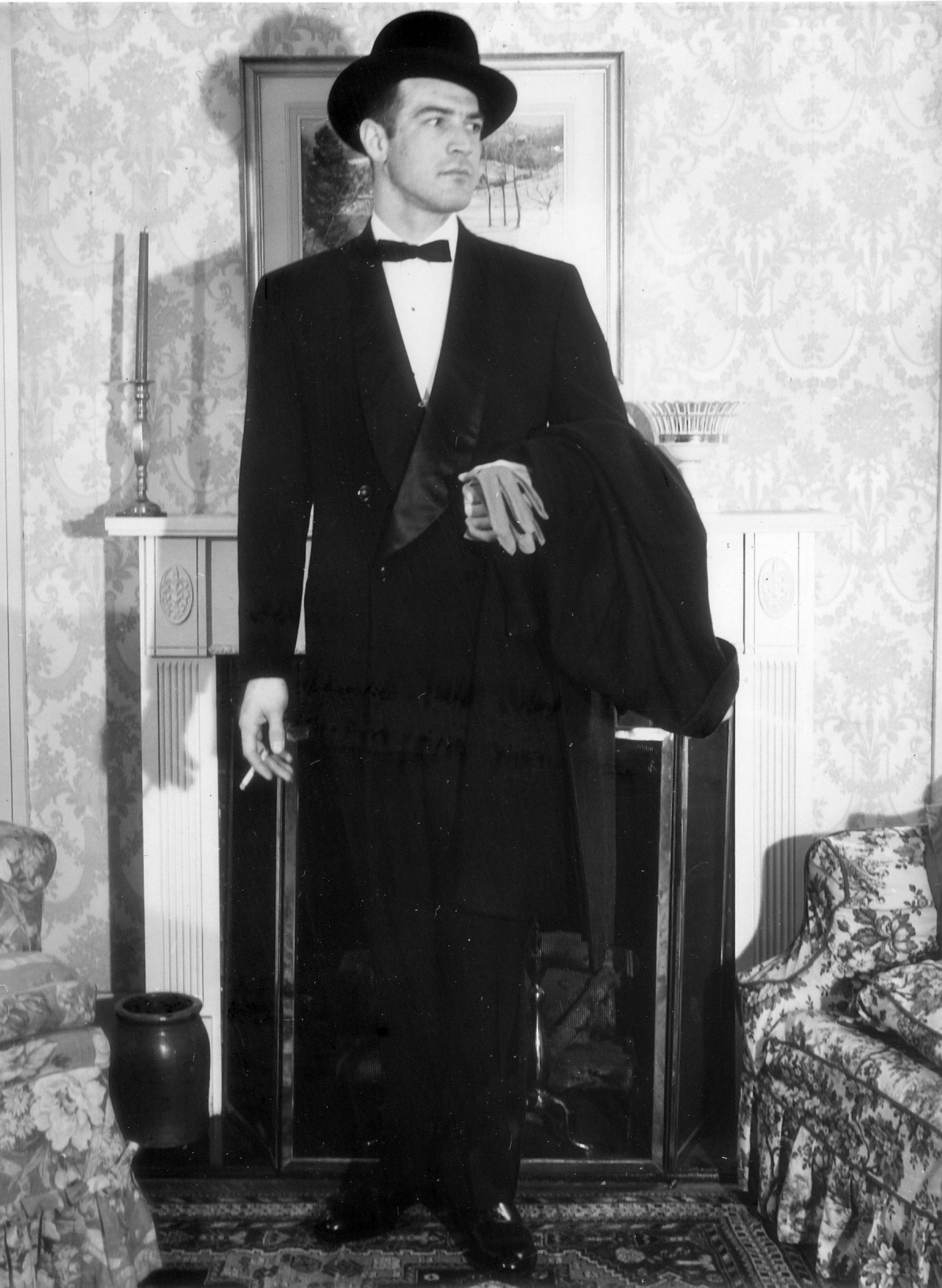
|
| Diplomat pose 1952 |
My dad was a foreign service officer, but on information/press and not policy — to the best of my knowledge. Somewhere in the recesses of my mind I think past attendance at one or two "communist" meetings or talks, in Oxford, OH I think, together with the frantic anti-communist witch hunts in the 50s eventually led to him leaving or being drummed out of the service [in 1953]. This would be ironic, of course, because he was a chronic critic of the commies.This jibes with what Pete once told me himself about having been involved in antiwar activities during the runup to the US entry in WWII. I'm not sure how his later aversion to communism came about (after all, without the USSR the Allies would have lost the war in Europe), but it is the main theme in his 1980s Texas books. Danny found the source of "communist" allegation was Pete himself, something he wrote in a personal history statement in a government job application:
In the fall of 1938, while editor of my high school paper, I attended a CP meeting in Cincinnati to hear Earl Browder speak and write a report on it. The report, in editorial form, was not favorable.Danny says:
I think the years between the war and the mid-fifties were years of what would be called these days 'finding himself' — I don't think he ever did, as he was always searching for some interesting adventure, learning something new (piano and flying in his sixties, for example) or attempting some great endeavor. Even in his last few months, when he was in pain with bone metastases and bed-ridden, he was hatching grand schemes or working on new book outlines. He was itinerant during the years between the war and the early- to mid-1950s, looking for adventure, chasing dreams, looking for employment... probably quite hard years, as I have found (in much less desperate circumstances) when I aimed for something different outside the mainstream. He did a very wide range of jobs, in different towns all over the country and Europe (taught English in Madrid, movie extra in Sweden, and lots more), never for long. I think he was meant to live in another era, not a world of corporations and pensions.Amen! Finally after six years of military service and about eight more years of knocking around, he resumed his formal education in the mid-1950s, enrolling at Georgetown University in Washington DC and living with his mother. It turns out the "living with Hopis" story (and they weren't actually Hopis) is rooted in a research project for his degree in Linguistics in 1956, when:
Georgetown undergraduate student Daniel Da Cruz traveled to Oklahoma in the company of his linguistics professor, Paul Garvin. While Garvin worked on Wichita, Da Cruz woked with a Caddo woman named Sadie Bedoka Weller. In 1957 he finished a senior essay on the phonemes of Caddo, but he did not pursue linguistics further ... Other Caddo speakers have contributed to our knowledge of the language in a variety of ways, but Mrs. Weller stands out as the most important of all Caddo consultants. She was born in 1901 and died in 1970.The Caddo Nation is a confederation of tribes from Oklahoma, Texas, Louisiana, and Arkansas (more info here). The Caddo people were removed to Indian Territory in 1859. They are also known as Kadohidacho, Hasinai, Hatsinai. Danny has a November 2017 email from emeritus linguistics Professor Wallace Chafe at UCSB that says:—Michael D. Picone and Catherine Evans, New Perspectives on Language Variety in the South: Historical and Comtemporary Approaches, University of Alabama Press (2015), ch.3.
I never met your father. When I first met Sadie Bedoka Weller in 1959 your father had already been there, and Sadie mentioned him often and fondly. My understanding was that your father had been an undergraduate at Georgetown and that he came to Oklahoma with his professor, Paul Garvin, who was himself working on the Wichita language. In 1957-58 your father tape-recorded a number of sessions with Sadie and used the material as the basis for a senior essay on the phonemes of Caddo. It was called "A Revised Analysis of Segmental Phonemes in Caddo"[1]. He was kind enough to give me all his Caddo tapes before he went to Lebanon. I eventually digitized all his recordings and they are now living on my hard drive. I continued working with Sadie through the 1960s, until she died in 1970. I became involved in a number of other projects after that, and only recently got back to pulling together a description of Caddo that I hope to publish in another year or two. What your father did was quite valuable, and I will certainly give him full credit for it.
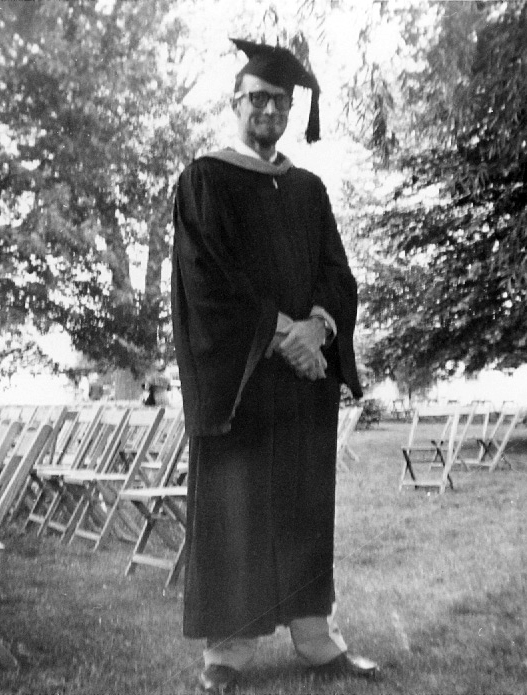
|
| GU graduation 1957 |
http://cla.berkeley.edu/collection/10163 for the main page to the collection.Pete graduated Magna cum Laude from Georgetown University in Linguistics in 1957, 20 years after graduating from high school. His mother Gus had died in 1955 and his father Daniel was 77 years old and 1600 miles away in Colorado Springs, but my Mom, Dad, brother Dennis and I came, and I was the official photographer at age 12 (see more photos in the gallery).
- Daniel da Cruz, A Provisional Analysis of Segmental Phonemes in Caddo, Submitted to the Institute of Languages and Linguistics of Georgetown University in Partial Fulfillment of the Requirements for the Degree of Bachelor of Science in Linguistics, May 1957. Sent to me by Professor Anthony Grant, Edge Hill University: "As a linguist interested in Caddo, with a close friend who lives in Oxford OH (and who also has Portuguese ancestry) I was intrigued to read your family history. I've known about Daniel's Caddo work for decades (and have a copy of his senior essay), but I hadn't fully realised the same Daniel da Cruz was the thriller-writer. ... And his teacher, Paul Garvin, is one of my linguistic heroes. ... Here's the paper. Your uncle must have given it to Paul G and Wallace Chafe (RIP, a nice man), Wally passed it onto Lynette Melnar, who gave it to me. I'm delighted and honoured to return this treasure to the family. Most of it is from Sadie, some from a lady named Eva Luther. Wally Chafe incorporated this into his book on Caddo which appeared in autumn 2018[2], a few months before he died in February last year."
- Wallace Chafe, The Caddo Language: A Grammar, Texts, and Dictionary Based on Materials Collected by the Author in Oklahoma Between 1960 and 1970, Mundart Press, ISBN 978-0-9903344-1-5 (2018).
Aunt Leila
[SEE IN FAMILY TREE]

|
| Aunt Leila 1960 |
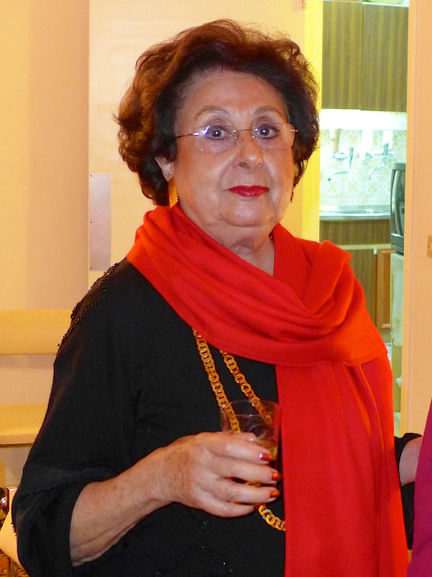
|
| Aunt Leila 2013 |
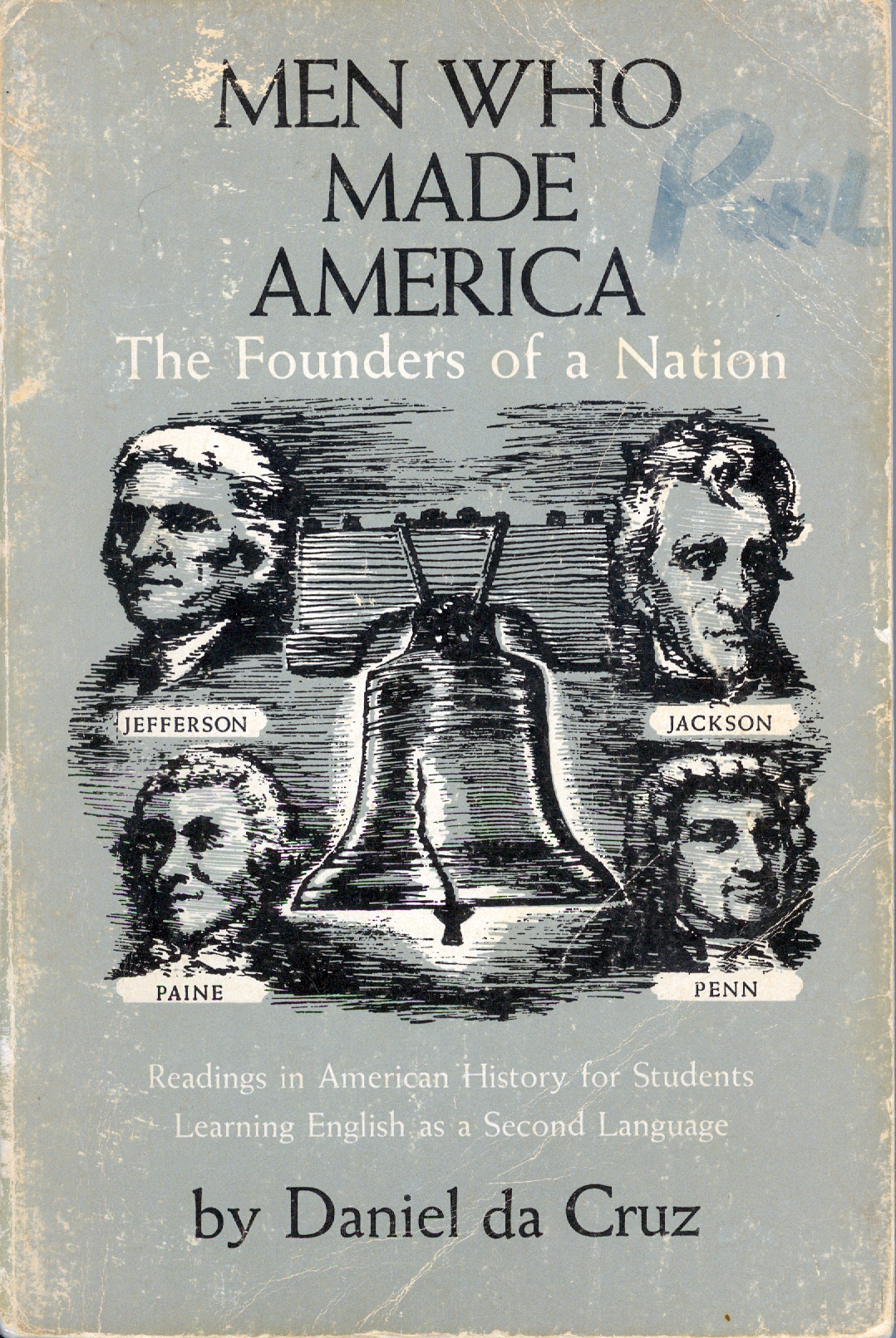
|
| Men who Made America (1962) |
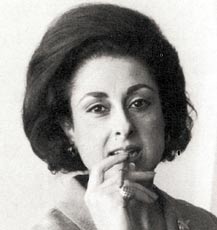
|
| Leila mid-1960s |
She was an accomplished woman in her own right. In business, she was editor-in-chief and head of a publishing company that for many years of put out a bunch of American comics in Arabic — Little Lulu, Superman, Batman... — these were among the few interesting/fun texts kids could read and enjoy in the Middle East back in the 60s and 70s, when most other publications were dry or religious. (An ex-employee of hers put together a paean to the Arabic version of Little Lulu, which I helped him convert to a website — not much there but here's the link). She, her mother and her sisters were always very active in serving the YWCA and the American University of Beirut hospital, and mom volunteered there a day a week up until her mini-stroke earlier this year (she's much better now). She was the member of the World YWCA Executive Committee and also wrote a small history of the YWCA in Lebanon, and about her experiences as the long-time work on the committee. Her sister still runs the institution in Lebanon, helping poor women from all denominations make a living for themselves and avoid predation.In 1947 Leila witnessed the partition of Palestine. From her journal:
Palestine, Nov 30, 1947 - Saturday. Went out sight-seeing for the last time in the old city. Had a lovely time - All over the walls & going in thru all the gates. That night the partition of Palestine was decided by the U.N.O. and everything was spoiled.Danny explains (2018-01-14):Dec 24th - Left Palestine for the Lebanon. The trip was very pleasant until we had to go back from the British Nakoura to Haifa to renew the cholera injection certificates. Shooting in the Hadar area in Haifa. Otherwise all was safe except for the tension.
This entry relates to her brief time teaching in Palestine. After graduating from the American University of Beirut in spring 1947, my mother went to Palestine for the summer to kick back a bit and visit the family. She spent time visiting the country and the relatives, and by the end of summer she had an offer to teach at the Friends School in Ramallah (a Quaker school set up in the 19th century and still going strong). Both our grandparents (Palestinian grandmother and Lebanese grandfather) taught there, I suppose just after the First World War. In fact, they met there and the hitch was facilitated by the headmistress. Anyway, the head of the school still had very good memories of my grandmother and were in touch, so she offered my mother a job teaching high school, which my mom took.As of August 2020 at age 93, Aunt Leila still lived in Beirut in the same apartment where she and Uncle Pete raised Lina and Danny. She survived the August 4th Beirut explosion with some flying-glass wounds to her arm and leg and the apartment has broken windows but is still habitable.By the time of partition a couple of months later, strife from both sides had begun and things were unsettled enough that the school closed. As she was planning to go to Beirut at Xmas to spend it with her family, she headed back — hence the [second] entry.
Naqoura used to be the main crossing between Lebanon and Palestine on the coast. I understand she was turned back from there for not having cholera shots and had to get them in Haifa. Mom said this morning that there was shelling between both sides in and around Haifa when she was there.
Finaaly Lina reports that Leila "died in her sleep in her bed at home" Saturday, November 4, 2023, "as was her wish. Mariam, her companion who has been living with us for over 40 years was with her and Danny and I flew in last night. Mom had not been doing well for a while and the last few months had been rough on her. Danny and I were here last month and spent quite a bit of time with her. She has been ready to go for a long while and her quality of life was greatly diminished. We are both relieved that she is finally at peace and no longer suffering. Danny’s son Amin was here too, having decided to come here to study Arabic and do an internship but he and Danny both left a few weeks ago when it was evident that things might heat up in Lebanon. So far, it looks like no one has an appetite for another war and we hope that that remains the case."
Articles by Leila Shaheen da Cruz:
- Manners In The Middle East, Aramco World, Volume 16, Number 2, March/April 1965.
- Stars of Arabic Comics (Preface), February 2014.
Lina and Danny
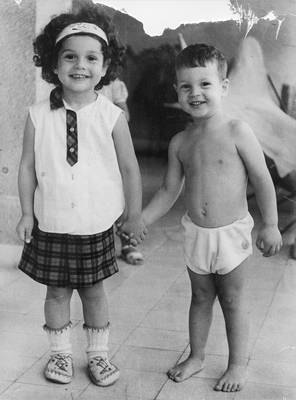
|
| Lina & Danny ~1965 |
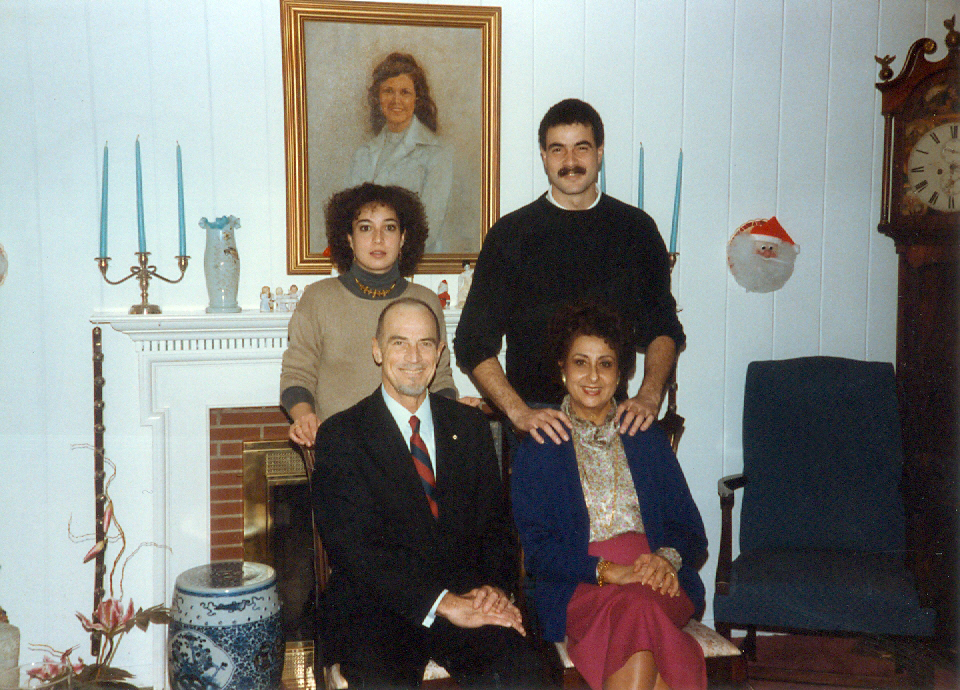
|
| Pete and Leila, Lina and Danny, 1987 |
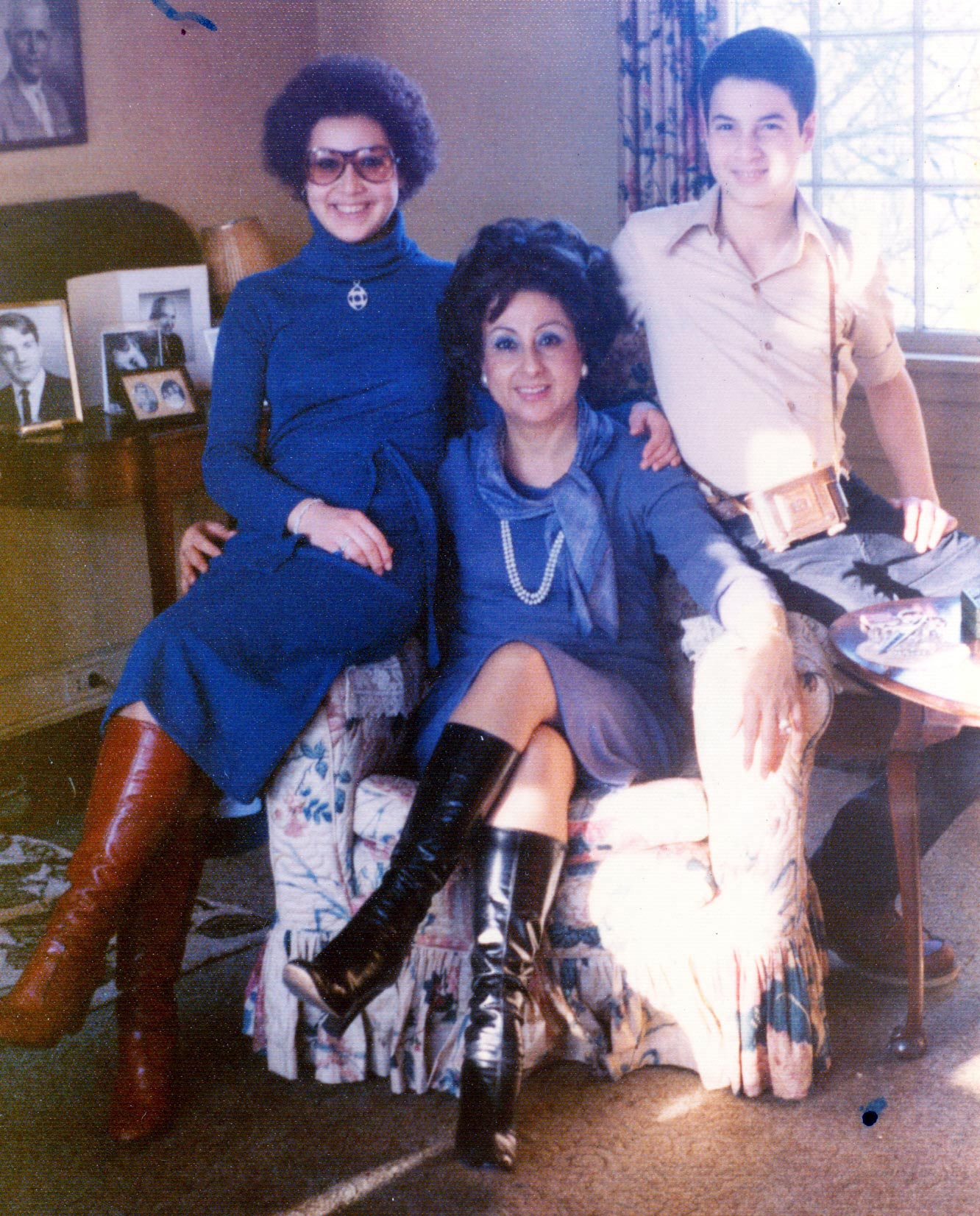
|
| Family in exile 1978 |
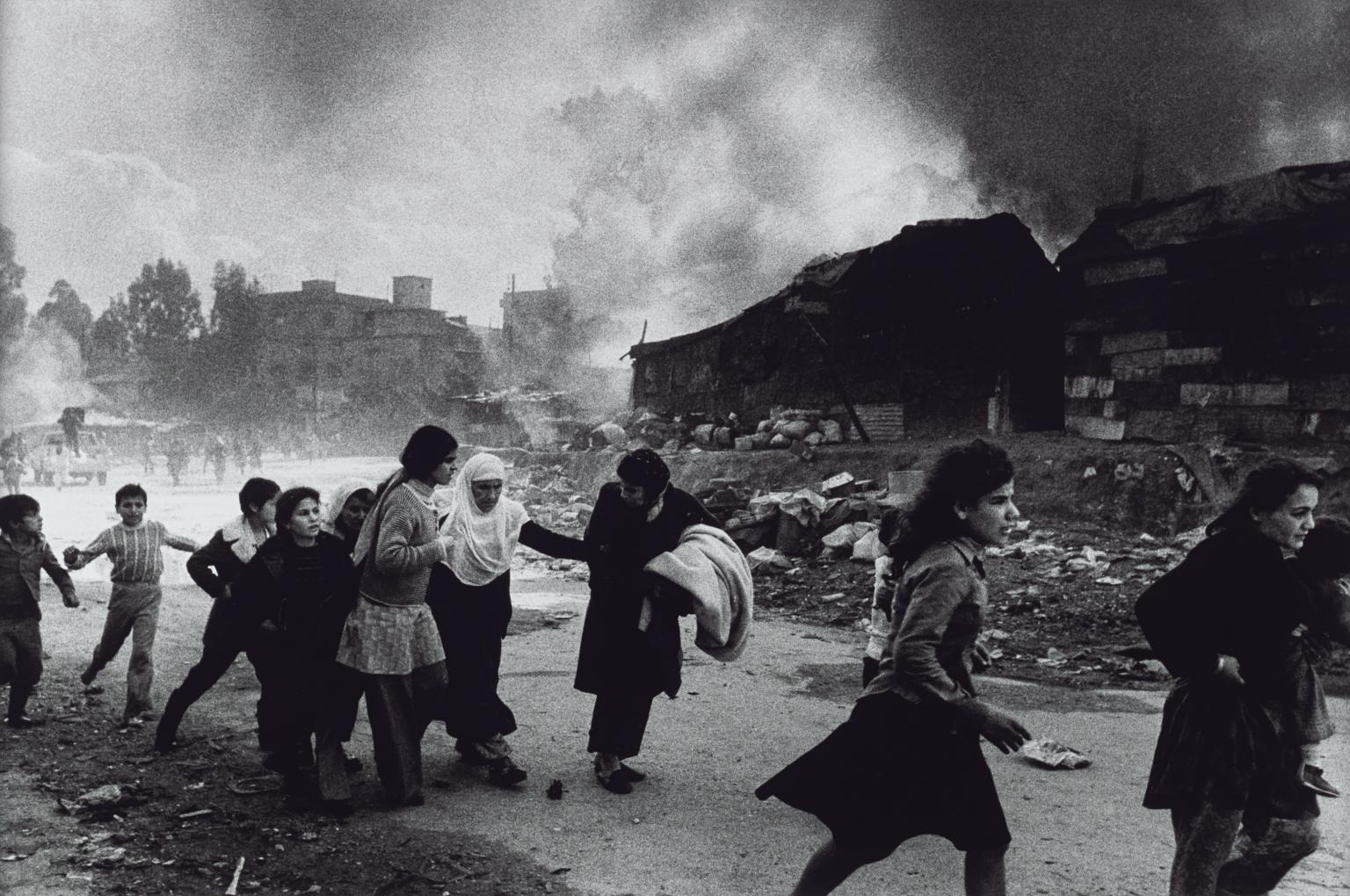
|
| Civil war in Beirut 1970s |
...they have both gained experience in hospital work under stress during the more active days of the civil war, when the bombs were falling around us, and they acted as nurses for the ghastly casualties who streamed in, sometimes up to 175 a day, so that the regular medical staff — what was left of them — couldn't cope with the load without volunteers like Lina and Danny.In a 1979 letter to my dad, commenting on the gas lines in the US, Pete says:We were considering, before we were offered a house and car rent free by a childhood friend of mine in Oxford, to go to California, very probably, coincidence, in Long Beach. My wife Leila has a first cousin with children the ages of ours, and it would have been good for them to have as companions. In retrospect, I rather wish we had gone, as it would have given them the opportunity of meeting your mother and you, the fresh air of California, and the sea which we missed.
I filled in Los Angeles after waiting for half an hour, and could happily predict the future from what grousing I saw. I find the Americans hopelessly spoiled, and wish them the worst ... They were not concerned for the many many years the Arabs were forced to accept one cent per barrel royalties for their oil, so they should shut up now. After all, nobody dictates to the U.S. the price they put on the wheat they sell the Russians. Anyway, let 'em cry — I love it ... Anyway, you still have it soft. In the war, which still goes on, less noisily to be sure, we have a lot tougher time of it than the Americans. We get water every other day -- sometimes, and electric cuts are frequent and for about eight hours at a time. I can see the Americans sticking that little inconvenience without revolution.
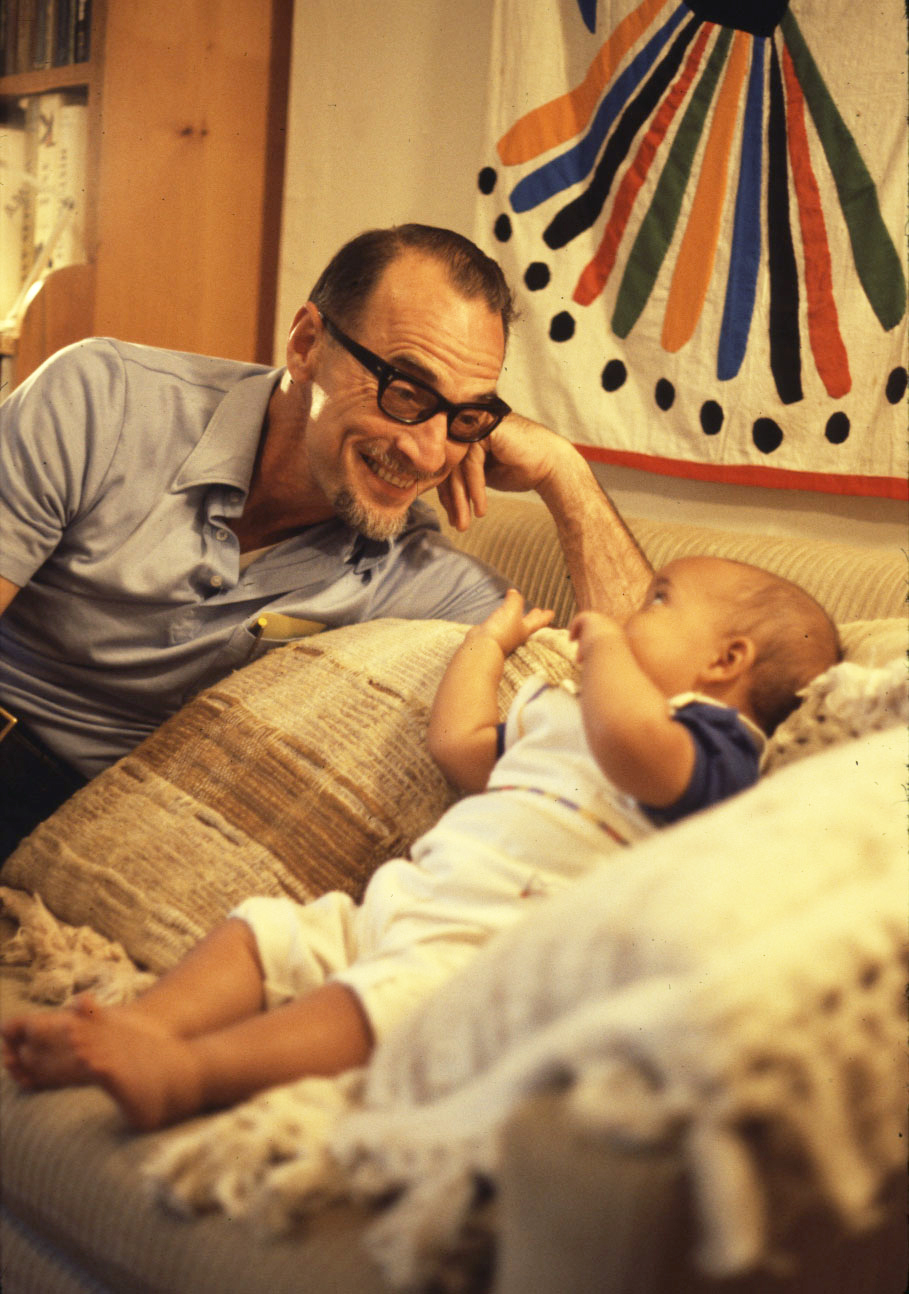
|
| Pete and Peter 1978 |
Cousin Danny
[SEE IN FAMILY TREE]I met Danny for the first (and so far, only) time in 1997; he was in NY for some business. He's a lot like his dad: polyglot, world traveler and adventurer, enthusiastic and ready for anything. He gave me some old family albums he found in his dad's apartment, which are the source of much of the information in here, and many of the photos. He has lived and/or traveled everywhere and knows the Portuguese side of the family.
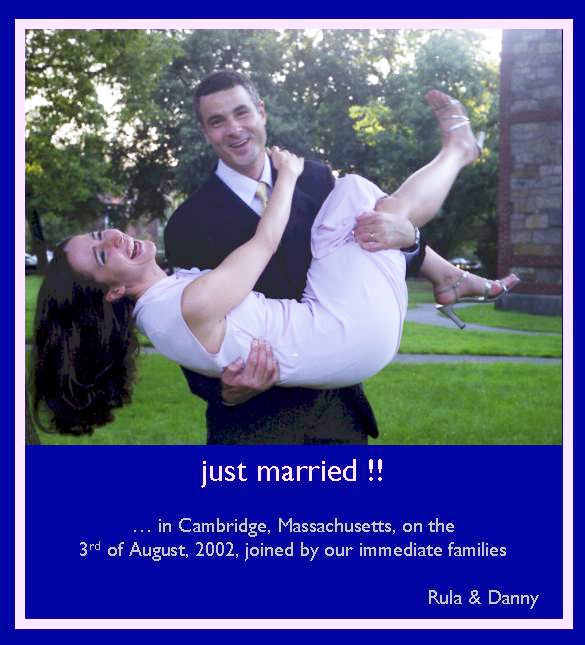
|
| Wedding picture 2002 |
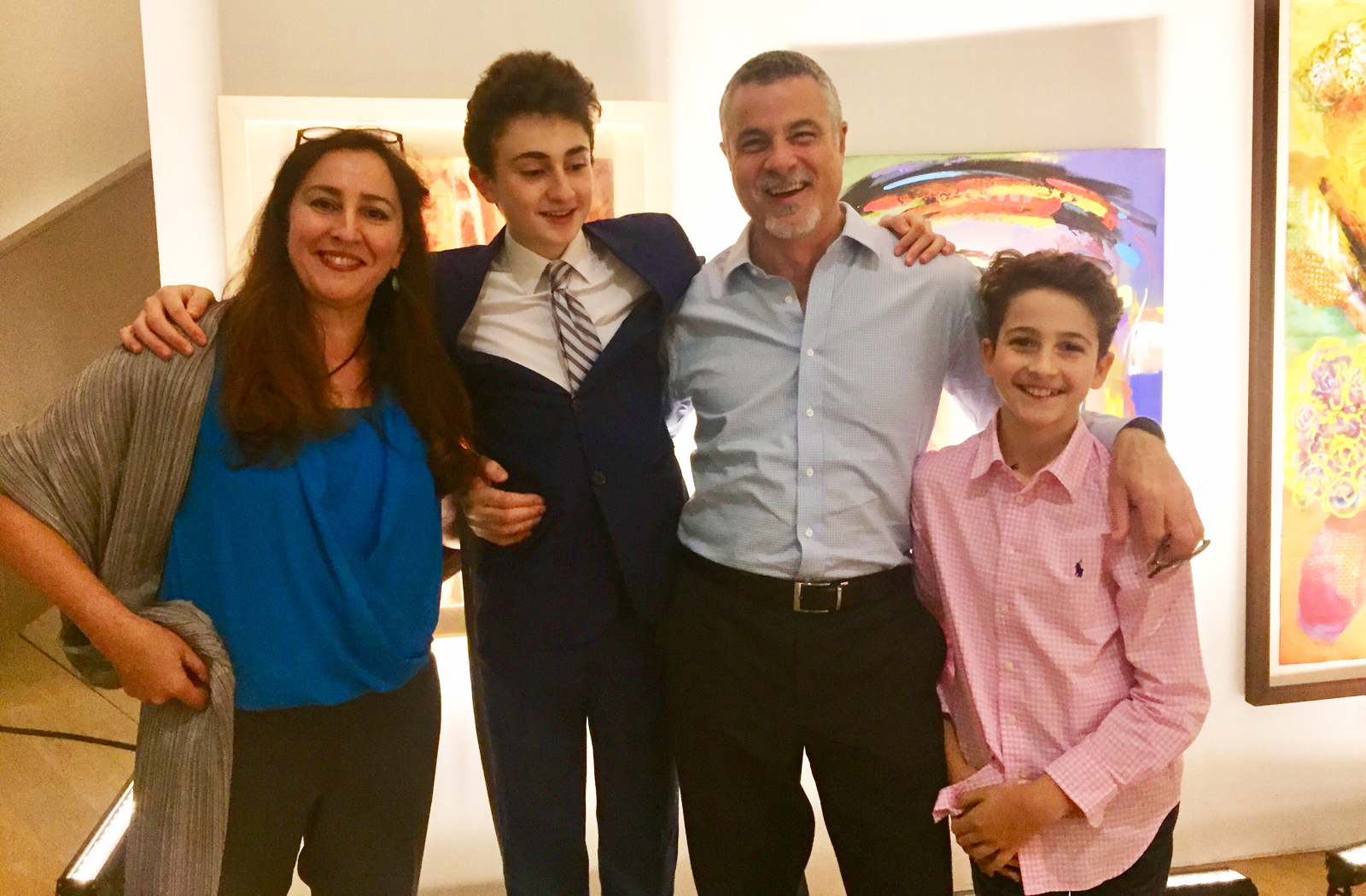
|
| Rula, Rakan, Danny, Amin 2017 |
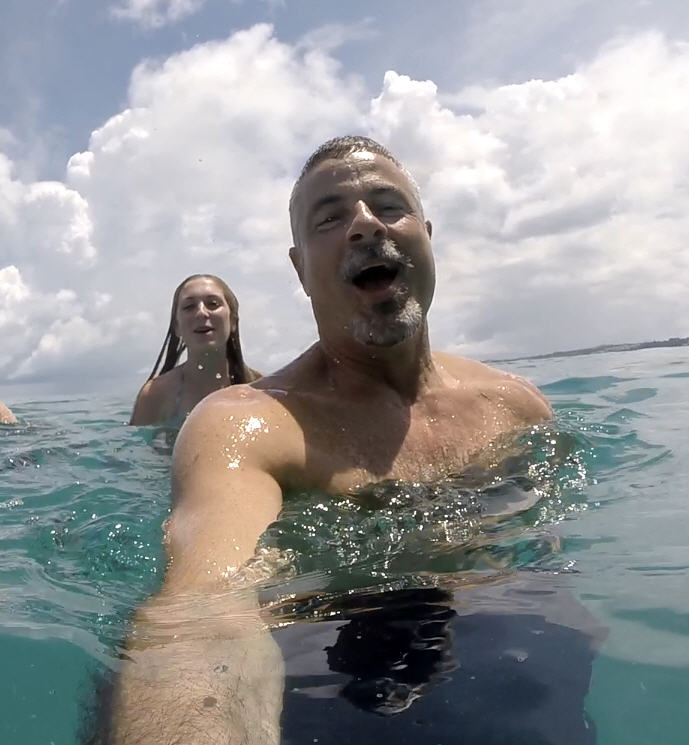
|
| Danny 2014 |
|
|
Work considerations aside, we are nearing the point where we want our kids to experience life in Europe or America. It's been hard to decide what a natural home for us would be at this stage, apart from London, so we're living with indecision while we examine options. It crosses my mind that Portugal is a place I'd like to spend time in, but since I still need to work it might be easier to do so in a primarily English-speaking country. Maybe later on in life we might make Portugal a base. Regrettably, and much as I love the place, Lebanon is not easy to think about for the long term because of the chronic political uncertainty and the regional forces that push and pull on the country.Danny is one of the major contributors to this history and to the family tree.I was in Beirut a few days ago to visit my mother and everyone is expecting another war between Israel and Hezbollah (they always are, mind you), which would mean another huge setback to the country if it happens. It's already struggling to cope with 1.5-2 million Syrian refugees, a stagnant economy, a destroyed middle-class, and a kleptocratic and feudal government made up of every sect and party. Those in power take every opportunity to stir their people against other groups, yet the politicians themselves are friendly towards each other and make money together. Sad, as our President Trump would say :-) (Don't get me started on him…).
Cousin Lina
[SEE IN FAMILY TREE]
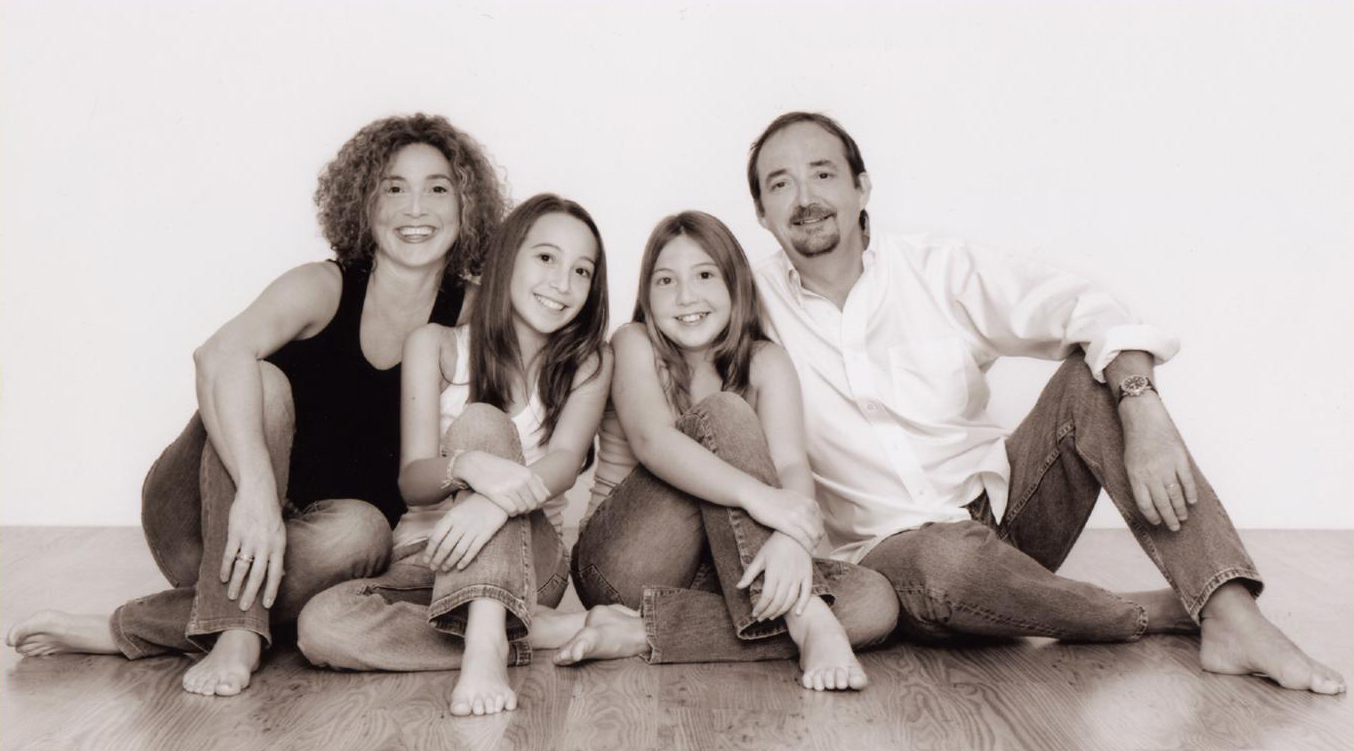
|
| Lina, Adriana, Alexandra, Jean-Luc circa 2002 |
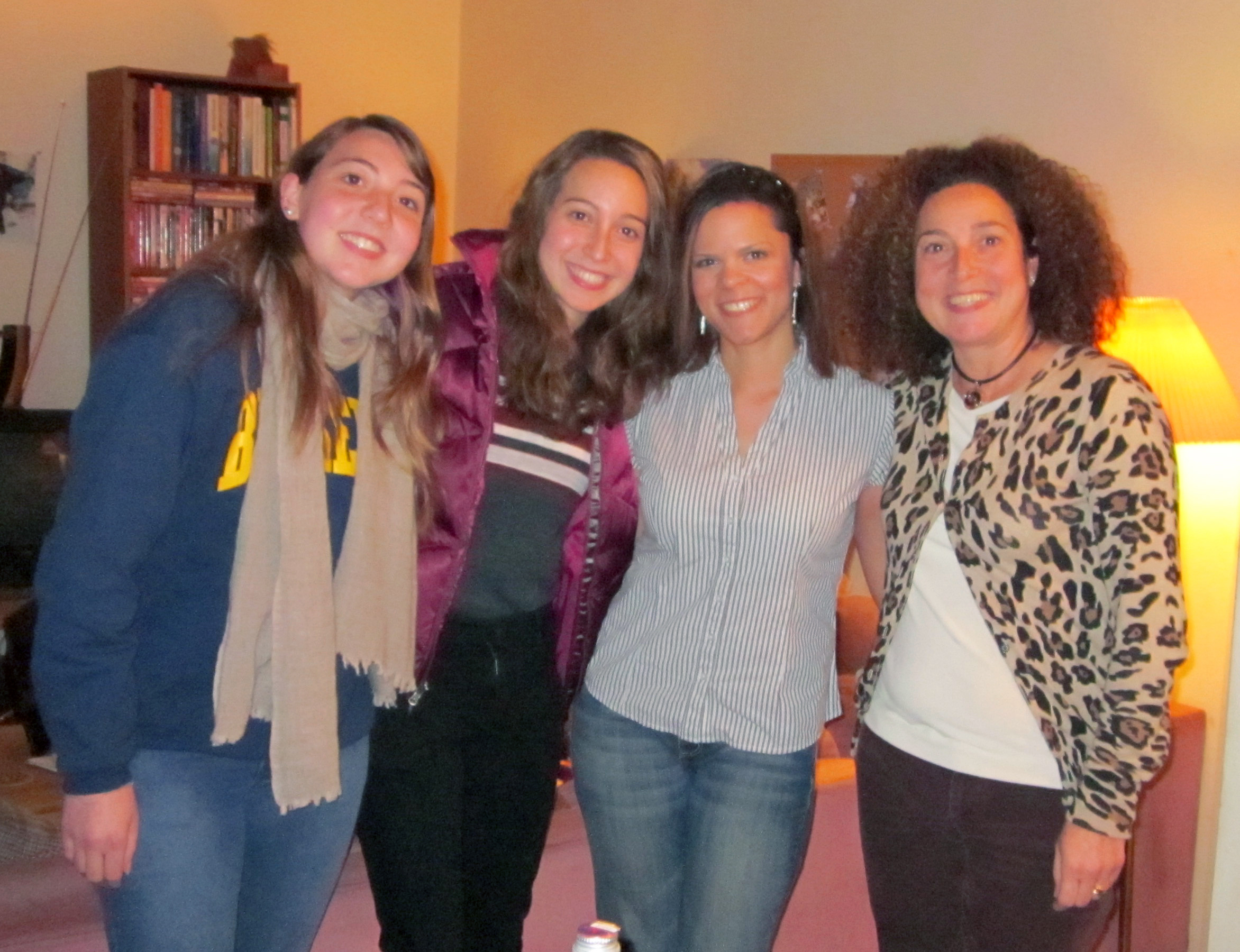
|
| Alexandra, Adriana, Amy, Lina 2010 |
Here's an exchange I had with Lina about her Dad:
> I think Dad was a real right-wing Republican now that I
> look back at his politics and his point of view on things. Maybe
> right-wingers then were not as bad as they are now, at least I
> wouldn't want to put him in the Fox News/Paul Ryan camp, maybe Tea
> Party, though.
>
It's true he had a lot of right-wing positions, but I'd put him in the class of World War II veterans who came away from the experience with the sincere belief that the USA truly was the good guy, and so went along with a lot of the later stuff (e.g. Vietnam) because of that faith. In that he was probably just like Jimmy Stewart or Clark Gable. In most things I looked up to him; he valued diversity and respected other cultures, he was not a racist (unlike his brother), he didn't reject science or history like today's right wing, and he had a sense of humor. And curiosity! And unlike any of today's rabid war hawks he had actually served in the military and seen combat. And plus, he had a realistic view of the Muslim world, not the grotesque caricature that predominates today. He had some pretty strong views on Israel's role in the disasters of the world over the last 60 years, based on first-hand experience. My son Peter, by the way, is a big fan of your Dad, they'd get along famously. Not only about Israel but he also bought and read most of your dad's books.Btw, I'm not sure if he was (or always was) a Republican. When I told him about my feelings on the Vietnam war, he said he used to be like me, he was a protester against getting involved in a European war for the benefit of war profiteers, but eventually came to be a big supporter of the war (obviously) and I presume also of FDR.
After Lebanon
Uncle Pete left Lebanon in the 1980s after his kids were grown up because it had become too dangerous for Americans to be there; the last straw was when he was kidnapped and friends of the family, particularly their surgeon friend Dr. Samir Shehadi, who wielded influence over the PLO at the time by virtue of all the lives he saved as a trauma surgeon, secured his safe release. Although the Shaheens were politically unconnected they had the affection and respect of many Beirut families through their educational and non-profit work. Leila remained behind; all her family was there. Her father was a long-time professor of physics and astronomy at the American University of Beirut.
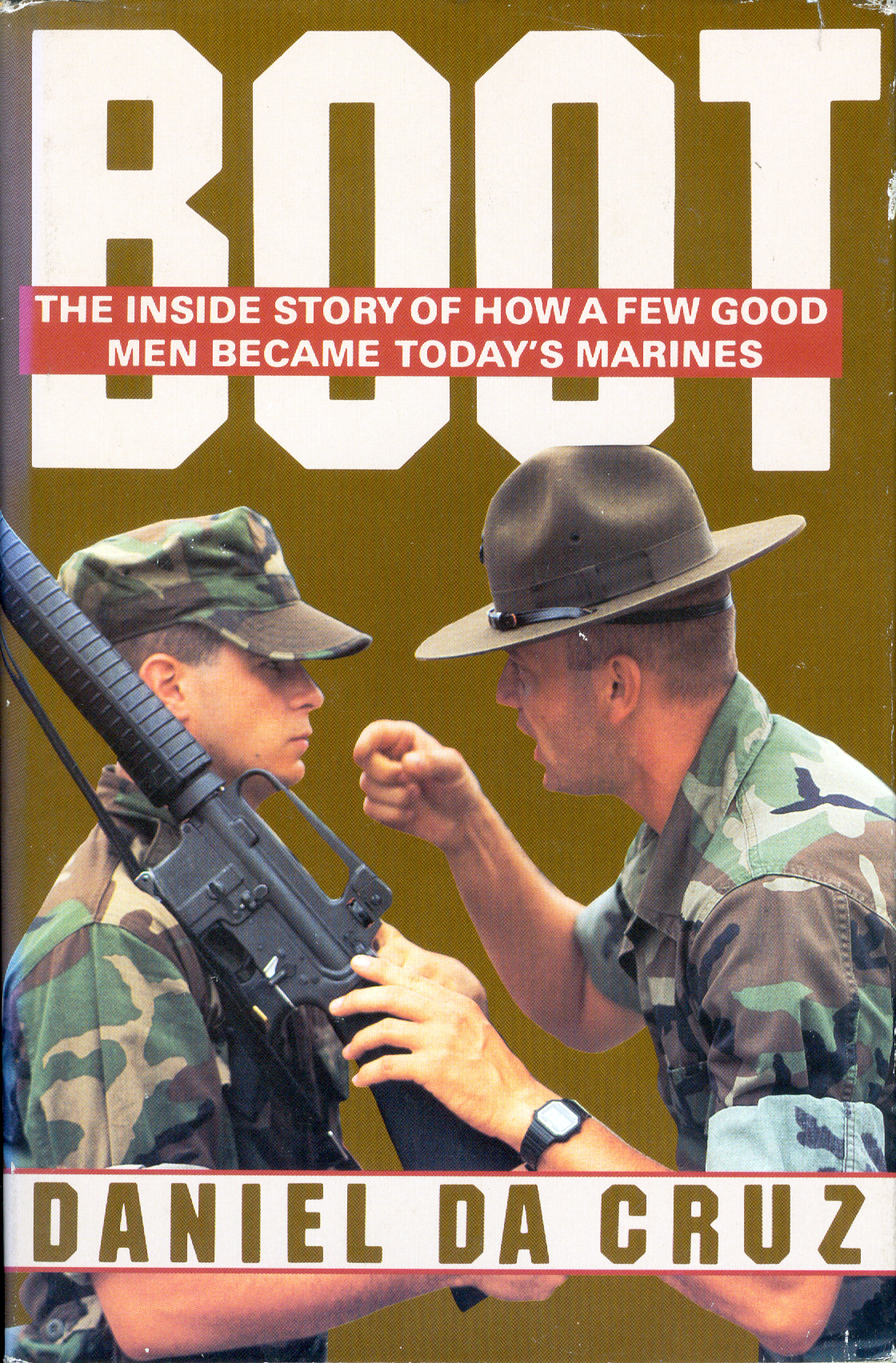
|
| Boot (1987) |
But in reality, Pete's politics didn't fit any particular mold. As noted, like many WWII veterans, he went through the rest of his life with the firm belief that the USA was the good guy, and therefore its adversaries — primarily the USSR — were the bad guys. He disagreed with my attempt to leave the Army in 1965 when the Vietnam "situation" turned into a full-scale war and at the same time the USA invaded the Dominican Republic. He wrote me a long letter on the topic, but (unlike those I received from my father) they were always affectionate and full of humor, noting that "my father told me that, as I was prepared to take the consequences of my acts, I was jolly well free to do anything I cared to do, with the proviso I didn't come crying later on when the consequences proved unbearable. I have so far been fortunate not to have to moan to him, although on more than one occasion my mother bailed me out when things got too sticky."
Nevertheless, he remained strongly anticommunist all his life, as his novels make abundantly clear. It is one trait he shared with my father, who was appalled when I was invited to the USSR to lecture on my work, but Danny says "I remember my father telling me about your trip, with some pride". Later on, both Pete and my dad admitted that I had a point about the Vietnam war. In any case Pete was not totally Rah-Rah-America as you can see from this November 11, 1981, Huntington WV Herald-Dispatch article about a series of lectures he was giving at Marshall University:
Life in Lebanon means bombs blasting outside your kitchen window, bullets puncturing the plaster and no police or army to protect you from gangs roaming the streets. ... He watched his children transported to school in convoys to avoid kidnapping. His family automatically moved around the house to escape the shaking of explosions, and he could point out the bullet holes in his walls. In an interview yesterday, the Middle East expert said foreign intervention has caused the chaos in Lebanon by supplying arms and magnifying minor outrages and incidents into excuses for war. He said major powers were using Lebanon as a testing ground for their weapons and armies with little concern for the inhabitants. They have brought their dirty laundry to air in Lebanon," he said. "Living over there you see daily the failure of American policy abroad. The Arabs are getting stronger, so the U.S. feels it must pour more support into Israel," he said. "They're just stockpiling gunpowder. The higher the pile gets, the more likely it is to go off." He concluded that the United States should withdraw from all diplomatic, political and military intervention and concentrate on commericial relations with countries that offer an equal exchange of goods. With the United States exerting its influence on the Arab nations, da Cruz said Israel could be persuaded to reach a "reasonable" agreement. Such an agreement might include provisions for an independent Palestine.In a 1971 lecture flyer he says of himself that that he:
covered the six Day War as well as insurrections in Iraq, Syria, Lebanon and Jordan, in all of which the American involvement was deep and disastrous — and avoidable. To avert a Mideastern version of the Vietnam folly, he favors strictly reciprocal American commercial and cultural ties with both Arabs and Israelis — but the least political and military involvement possible.He has expressed this viewpoint far and wide; even the National Review (July 15, 1969). I'd say Pete would be 100% in alignment with most of today's left on the Middle East, Israel, and Palestine, and with great deal more knowledge to back it up. He also would have noticed that the collapse of the USSR did not exactly turn the world into a peacable kingdom; quite the opposite: without the protection of the USSR, countries like Syria and Iraq were defenseless in the face of US interference and aggression.
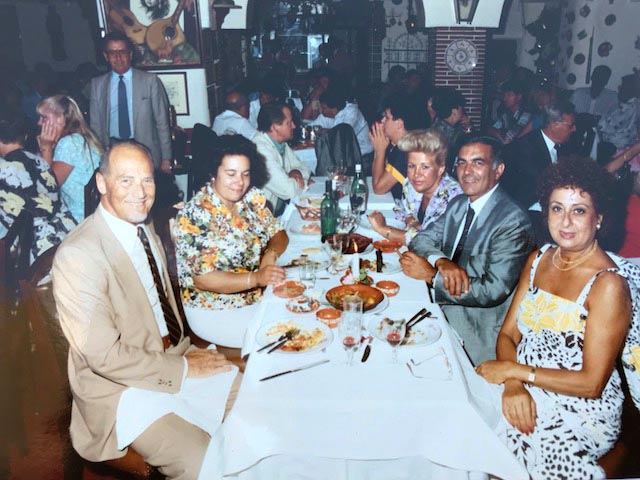
|
| Pete and Leila in a Fado house 1989 |
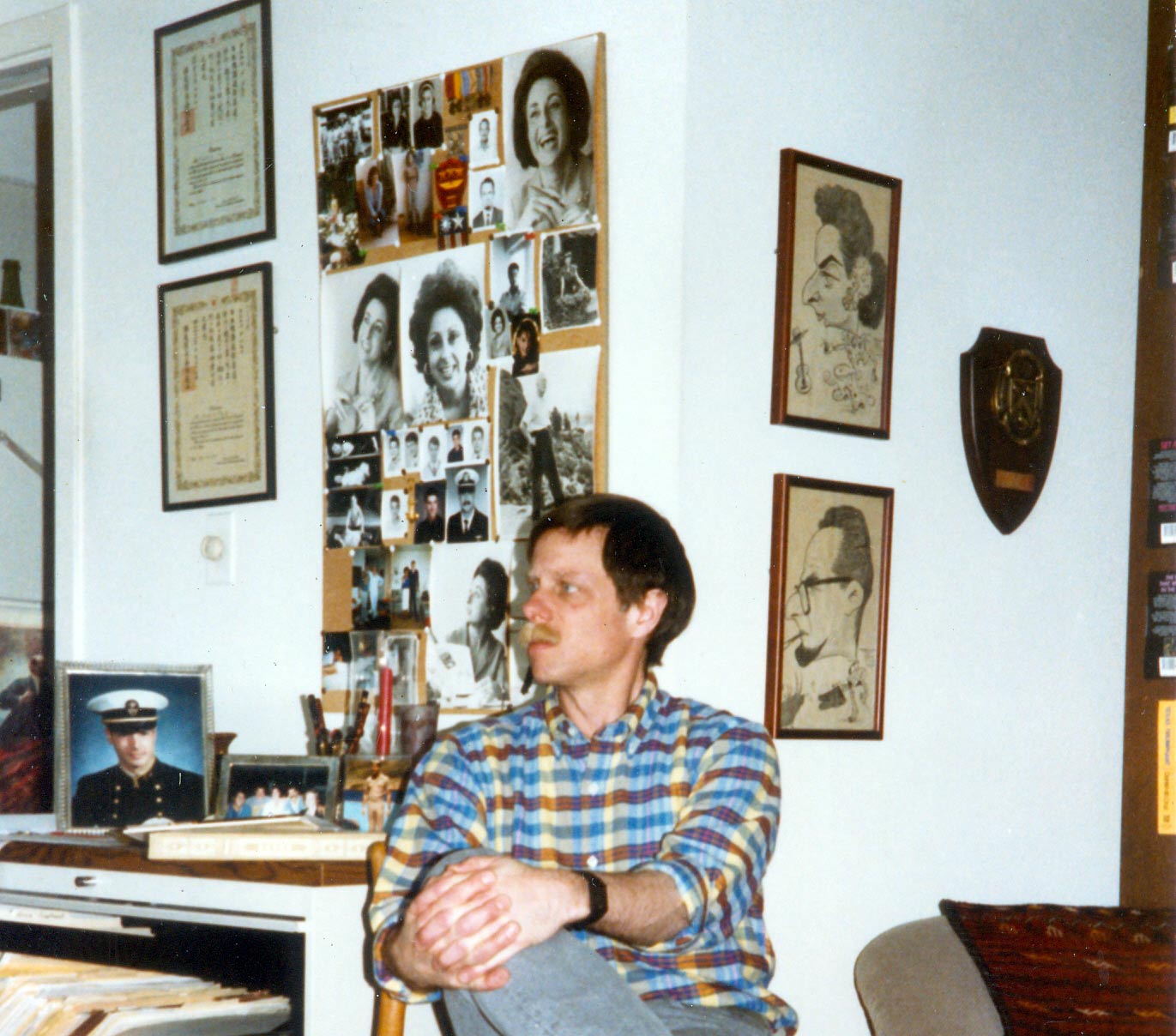
|
| At Pete's apartment 1988 |
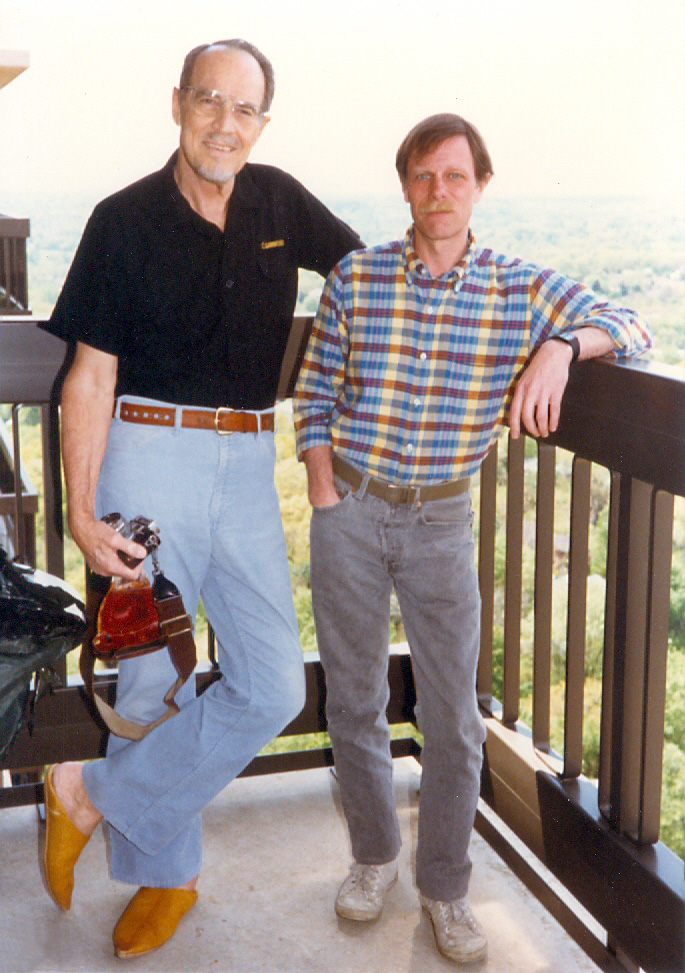
|
| Pete and me 1988 |
Uncle Pete lives on in Google, his books, and his progeny and those whose lives he touched. Many of his books and other works contain capsule biographies. Pete himself wrote the following one for the program of an Arab/American seminar:
Professor Daniel da Cruz has lived and worked in the Middle East for more than 30 years, as a diplomat, businessman, educator, journalist, lecturer and author. He spent six World War II years as a U.S. Marine volunteer in the three war theaters, ashore, afloat and aloft.There's a great deal I don't know about Uncle Pete's life but even from these scraps and fragments it's clear that he lived life to the fullest and had a range of experience few could equal. His nephew Rif (Rifa'at Haffar, son of Leila's sister Najwa) said, "He had a huge influence on me, this irreverent iconoclast who startled a family steeped in Ottoman and Imperial British propriety. And he kept on startling us for as long as he lived. I miss him and think of him often."A magna cum laude graduate of Georgetown University's School of Foreign Service, he has been variously a census enumerator, magazine editor, editorial consultant for the Arabian-American Oil Company, judo master — he holds a Second Degree Black Belt of the Kodokan Judo Institute in Tokyo, taxi driver, farmer, public relations officer for Texaco, salesman, chief Middle East correspondent for a leading American news agency, publishers' representative, vice-president of a major New York advertising agency, slaughterhouse skinner, captain of a Texas security organization, American Embassy press attache in Baghdad, copper miner, member of the English faculty at the American University of Beirut, and Adjunct Professor of Anthropology at Miami University.
Professor da Cruz has written hundreds of articles on Middle Eastern politics, economy, military affairs and culture for the Washington Post and other major U.S. dailies, the Reader's Digest, the National Review, Time, and Newsweek.
He is the author of 17 published books, a number of them highly reviewed, among them the winner of a Special "Edgar" in the best-mystery-novel-of-the-year category. His latest non-fiction work [Boot] was a Main Selection of the Military Book Club.
There's one more thing I'd like to mention about Uncle Pete: he was intensely loyal to all family members whatever their quirks or faults, notably including his brother (my father), who was bigoted, cruel, and brutal; his father, who was aloof and unfeeling; and even me when my politics took a turn directly opposite his. (He did, however, draw the line at stepmother Louise; Danny says he had "nothing good to say about her. For him, she was a quintessential horrible step-mother, and he complained about her driving him and Fran hard with housework and generally making their life unpleasant. One anecdote I remember is my dad feeling shame and anger when Louise wouldn't let him bring a Jewish friend of his into the house.") Of my Dad, Pete wrote in 1965:
He's never had the talent for putting things in the most gentle phrasing; with him it's better to concentrate on meaning than tone. Though certainly you doubt it, all he has to say is for your own good and in your own interest. You should know by now that every father seems a clod to his son — until he becomes a father in turn and realizes he's saying the same things he heard a generation before. Remember, he has his troubles too.In my case, when I applied (unsuccessfully as it turned out) for early discharge from the Army as a conscienscious objector, Pete strongly disapproved, writing (toward the end of a 7-page letter):
You took your first steps from your mother to me. And in the East, my adopted home, the conception of family is somewhat different from that in the West, where it seems to be a collection of people who occasionally sup together and retire at the same time after the TV is turned off. As far as I'm concerned you are my nephew and you can call on me for anything I can provide whenever it is possible, whether you get out as c.o. or not.In fact, I saw him a few months after that; we spent a week together and the c.o. topic didn't even come up. I don't have a copy of my reply to his letter but it probably said something along the lines of "World War II was a fight to save the world from German Fascism and Japanese imperialism, but Vietnam was a poor country that posed no threat to us or anyone else, and only wanted to be left alone; there was no justification for the United States killing Vietnamese people," a sentiment he came to agree with in later years.
Books by Daniel da Cruz II
Jock Sargent series...
- Double Kill, Fawcett Publications (1973)
- L'Ombre de Caïn ["The Shadow of Cain", French edition of Double Kill], Gallimard (1973)
- Deep Kill, Fawcett Publications (1974)
- Sky Kill, Fawcett (1974)
- Sei
so nett und stirb für mich, Pabel Verlag, Rastatt (1973)
["Be so kind as to die for me", probably a German edition of Deep Kill or Sky Kill] - Fire Kill, Fawcett / Coronet (1976)
Ape Swain series...
- The Landfall Finesse, Ballantine Books (1975)
- The Pipe Dream Finesse, Ballantine Books (1975)
- The Captive City, Ballantine Suspense (1976)
Republic of Texas series...
- The Ayes of Texas, Del Rey / Ballantine (1982)
- Texas on the Rocks, Del Rey / Ballantine (1986) (inscribed "For Frank, herein you will learn more than you want to know about the aqueous Armageddon. Love, Uncle Pete, May 2, 1988")
- Texas Triumphant, Del Rey / Ballantine (1989)
Other novels...
- Vulcan's Hammer, New American Library (1967)
- The Grotto of the Formigans, Del Rey / Ballantine (1980)
- F-Cubed, Del Rey / Ballantine (1987)
- Mixed Doubles, Del Rey / Ballantine (1989)
- S-Waffen (in German), Verlag Heyne München (1993)
Nonfiction...
- A Provisional Analysis of Segmental Phonemes in Caddo, Georgetown University (1957).
- Men Who Made America: The Founders of a Nation, Thomas Y. Crowell Company NY (1962)
- Men Who Made America: A Nation Comes of Age, (probably also Thomas Y. Crowell Company NY) (1964)
- Boot, the Inside Story of How a Few Good Men Became Today's Marines, St. Martin's Press NY (1987)
Aramco World Articles
(from his son, Danny...)- The Black Tent, MJ 66: 26-27, writer
- The Camel in Retrospect, MA 81: 42-48, writer
- Classroom in the sky, JF 78: 4-11, writer
- Convoy To Nowhere, MJ 69: 6-15, writer
- Deus Vult!, MJ 70: 2-11, writer
- A Drop Of Rain, JA 64: 24-29, writer
- Dry-But Why?, JA 67: 6-9, writer
- End of a Vision, MJ 70: 32-40, writer
- An Enemy Below, JA 65: 12-13, writer
- Horatio Ali, Jr.: The Story of Nahar Nassar, JA 69: 31, writer
- How They Find The Oil, JF 66: 1-11, writer
- The Long Steel Shortcut, SO 64: 16-25, writer
- Mirages, SO 68: 28-29, writer
- The New Breed, ND 69: 30-36, writer
- Phoenix Of The Plain, MA 67: 3-9, writer
- Pilgrim's Road, SO 65: 24-33, writer
- Plague Across The Land, ND 67: 20-25, writer
- Proud Centennial, MA 66: 1-11, writer
- Queen of the Desert: Lady Hester Stanhope, SO 70: 8-13, writer
- Silks And Seeds And Silver Swords, MJ 65: 26-32, writer
- Silver Threads Among The Clouds, JA 69: 28-36, writer
- T.V. In The M.E., SO 67: 19-25, writer
- Worry Beads, ND 68: 2-3, writer
- Writing From A to Z, SO 66: 14-20, writer
- At The Turn Of The Tap, MA 66: 14-21, writer
- Byblos: Middleman Of History, SO 64: 3-9, writer

